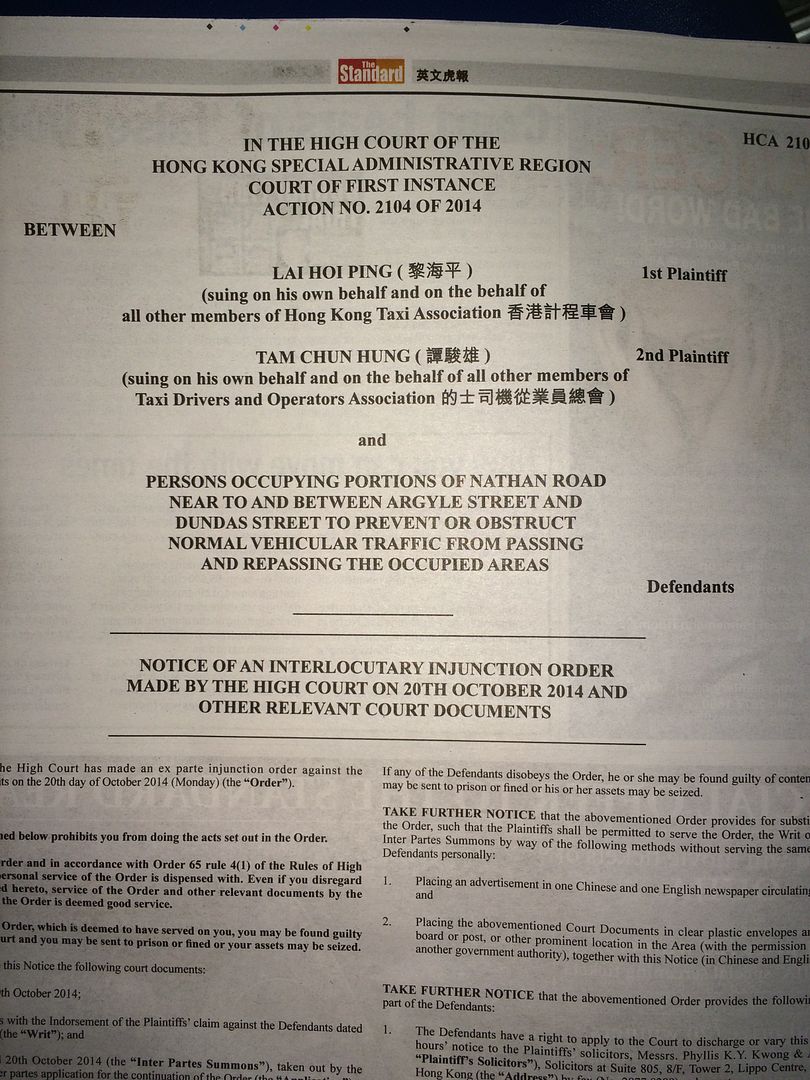-
IP addresses are NOT logged in this forum so there's no point asking. Please note that this forum is full of homophobes, racists, lunatics, schizophrenics & absolute nut jobs with a smattering of geniuses, Chinese chauvinists, Moderate Muslims and last but not least a couple of "know-it-alls" constantly sprouting their dubious wisdom. If you believe that content generated by unsavory characters might cause you offense PLEASE LEAVE NOW! Sammyboy Admin and Staff are not responsible for your hurt feelings should you choose to read any of the content here. The OTHER forum is HERE so please stop asking.
You are using an out of date browser. It may not display this or other websites correctly.
You should upgrade or use an alternative browser.
You should upgrade or use an alternative browser.
#OccupyCentral thread: Give me Liberty or Give me Death!
- Thread starter Asterix
- Start date
Re: Give me Liberty or Give me Death! Giordano Tycoon joins Occupy Central!
OCCUPY CENTRAL - DAY 24: Full coverage of the day’s events
PUBLISHED : Tuesday, 21 October, 2014, 3:30pm
UPDATED : Tuesday, 21 October, 2014, 11:41pm
Staff Reporters
With the government insisting Beijing will not bow to protesters' demands, and students refusing to leave their demonstration zones until concessions have been made, the two sides remain deadlocked after an initial round of talks.
After the meeting, Chief Secretary Carrie Lam said the government would consider submitting a report to the Hong Kong and Macau Affairs Office about the public's reaction to the NPC Standing Committee's framework on political reform.
The Federation of Students' Alex Chow later described the talks as "vague" and said the government had not offered any concrete proposals in response to their demands for political reform by 2017.
______________________________________
11.30pm: That brings our live coverage to an end. Join us tomorrow morning for all the latest breaking news on the Occupy Central protests.
11.15pm Mong Kok: Federation of Students representatives Yvonne Leung Lai-kwok and Eason Chung Yiu-wah show up in Mong Kok to thank protesters for standing up for democratic values.
Leung criticises Justice Secretary Rimsky Yuen Kwok-keung, a fellow University of Hong Kong alumnus, for claiming to defend the rule of law at the expense of the public's demands for true democracy.
“The courts cannot solve a political problem, only the government can. But has anyone seen them come out to speak to the people?” says Leung, one of the five representatives at the talks with the government on today.
“At the talks with government officials today, I really wanted to say to Carrie Lam: ‘Long time no see’.”
Leung acknowledges that a court injunction had been issued for Mong Kok, putting protesters there at the risk of criminal proceeedings.
“All I can say is that we didn’t expect this ... But neither could I believe the Court of First Instance would be placed on the table [as a tool] by the government.”
Leung says she plans to remain at the Mong Kok camp for the rest of the movement until a consensus can be reached with the government.
“I hope everyone will stay here because we cannot simply allow the government in two hours, to use their sophistry ... and strip away the hard work we have achieved in the last twenty-something days.”
11pm Causeway Bay: About 150 people are watching a live broadcast of the Hong Kong Federation of Students' leaders giving speeches in Admiralty.
Some protesters criticise the fact that no mention was made about the Occupy sit-in taking place in Causeway Bay during the meeting between the students and representatives from the government.

10.30pm: An alliance of social welfare concern groups strongly criticises CY Leung’s recent comments about democratic reform in Hong Kong, saying they were discriminatory towards those in the city who earned less than HK$14,000 a month.
In the statement, the alliance accuse Leung of defending the interests of “foreign forces” by insisting on a political system that is biased towards large enterprises.
“We express our strong discontent and regret on the chief executive’s blatant neglect of the contributions made by Hong Kong’s lower income classes – which constitute the majority of the population – to the society and economy,” the statement read.
In the statement, the group urged the establishment of civil nominations for the 2017 chief executive's election and called for the abolition of functional constituencies in the Legislative Council to bring about an end to the current system - which it says “serves only big business”.
In an interview with overseas media on Monday, Chief Executive Leung Chun-ying said that if the government met pro-democracy protesters’ demands it would result in the city’s poorer people dominating any future elections.
During the interview, which was carried by the Wall Street Journal, the Financial Times and the International New York Times, the embattled chief executive reiterated his position that free elections were "impossible".
9.45pm: Some people in Hong Kong say the government had clearly stated its case and that the protests should end. Here are their views:
Robert Chow Yung, anti-Occupy activist from the Alliance for Peace and Democracy: “The government expressed its sincerity and it did what it could. But I can’t see students responding to that. I call on more people to … let the students know how upset they are [with the protests], and to show that Occupy does not represent the majority.”
Sammy Zhao, 40, mainland businessman: “Most people want a stable government and a stable economy. Of course I don't support [continued protests], because we are Chinese people and we should be united.”
Wyman Kung, 28, engineer and non-protester: “I admire the students’ persistence. I think they are brave and I appreciate their courage, but I think at this stage they should comply with the law and clear the roads."
9.40pm: Civic Party legislator Kenneth Chan Ka-lok says the talks are more like a “monologue”.
"I am very proud of our students. They eloquently expressed our demands for universal suffrage and the people's frustrations," he said. However, "I am very disappointed with the government. They didn't make an effort to address our concerns. They didn't even give reasons to people stop protesting.”
If nothing changes, Chan promised to veto the reform package. "As a political scientist I can't accept it as true universal suffrage,” Chan said.
Former Civic Party lawmaker Margaret Ng said the government responses were “empty and powerless” and dismissed the platform proposed by Carrie Lam as a delaying tactic.
She believes Occupy supporters would not retreat after the talks. Ng urged the government to hold a second dialogue with students as soon as possible.
9.20pm: Protesters and observers alike seem downbeat about a resolution to the stalemate. So what should be the next step? People sound off to SCMP reporters in the streets:
Kevin Ko, 32, insurance agent: “This was not even a dialogue. There was no interaction. Even if there are more meetings in the future I don't think it can be solved this way. We will have to keep occupying the streets.”
Andy Fong, 30, civil engineer: “The students performed well in the talks but I feel they weren’t aggressive enough … Students were facing tough opponents but they seemed to have forgotten about the bargaining chips they have on hand [the protest zones]. [Rimsky Yuen’s statement was also] not logical. Many people demand true universal suffrage, but may not take to the streets.”
Chan Wing-hung,18, Hong Kong Polytechnic University student: "The [government] didn't give any suggestions to improve the current situation. They didn't even guarantee that the NPC standing committee would receive the report. At least for this week, I think we should keep protesting.”
Eric Ma Kit-wai, Chinese University journalism scholar whose specialities include research on Hongkongers’ identity: “How the officials and police described the event [protests] is in such stark contrast to the experiences of those who have witnessed it first-hand. I was in Mong Kok and it was so peaceful. … How can we be convinced that the report would reflect the true views of Hongkongers if those who are going to compile it think in such a way?"
Alvin Leung, 29, watch salesman and non-protester: “They have been talking for so long, but I don’t know if it has any substance. The report to the State Council … and the proposed platform will be useless.”
Ming Lee, 20, student protester: “More dialogue will just waste everybody’s time. Talks like this will not get us anywhere. If she can muster the courage, [Carrie] Lam should come down [to Mong Kok] and talk to us directly.”
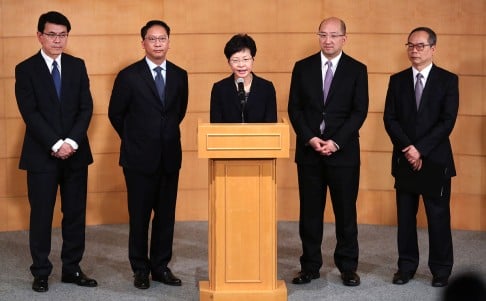
Chief Secretary Carrie Lam (centre) and government officials take questions from the media after the dialogue. Photo: Sam Tsang
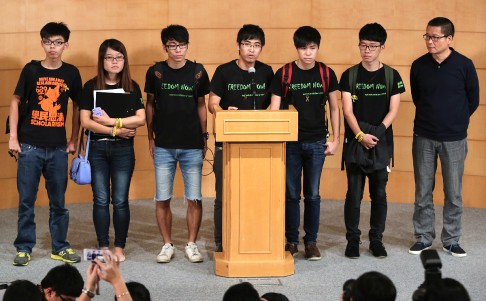
Federation of Students leaders also face the press. Photo: Sam Tsang
9.05pm: Dialogue moderator Professor Leonard Cheng Kwok-hon, president of Lingnan University, gives an assessment of his performance, saying he tried to be "as fair as possible".
Asked why he took part in fielding questions to the students, Cheng said: "I only wanted to let students explain their stance in a detailed way, so that the officials can hear clearly and follow up."
8.45pm: It's now the students' turn for a press conference. The five Federation of Students representatives answered one question in Cantonese, about the prospect of another dialogue, before abruptly ending the session and walking away.
Foreign journalists' request for an English statement went unmet.
After about three minutes, the students reappeared. Federation deputy leader Lester Shum said, "[Leader] Alex [Chow] will now recap in English" – echoing a now-familiar phrase used by police spokesman Steve Hui.
Chow, the student group's secretary general, said they still needed to discuss with different groups and parties before formulating their next action.
He described the dialogue as peaceful, but the proposals put forward by the government were "kind of vague".
8.30pm: Carrie Lam faces questions about the platform's functions and if it will focus on post-2017 discussions, as pan-democrats have vowed to veto the government's upcoming proposal.
Lam says she hopes the platform will "help handle the long-term development of the city's political system, because the development after 2017 ... might need [plenty of] time to discuss and to find consensus".
She says they will discuss who will be invited to become members of the platform and whether it will be a permanent committee.
Constitutional affairs minister Raymond Tam adds that Hongkongers should not only focus on the 2017 chief executive election.
8.15pm: Government officials are now holding a press conference after the dialogue.
Chief Secretary Carrie Lam was asked whether the government's report would describe the "umbrella movement" as one of love and peace, or as a colour revolution. Lam said the report would "reflect public opinion ... And won't insert subjective descriptions".
Constitutional affairs minister Raymond Tam added that his bureau would file the report "in the most efficient way". "If there are public opinion surveys during this period of time, we will include them in the report," Tam said.
8.04pm: That's it, it's all over. Both sides are thanked for taking part.
During the two-hour dialogue Alex Chow spoke four times, while Nathan Law and Yvonne Leung spoke three times each. Eason Chung and Lester Shum spoke twice each.
On the government side, Carrie Lam spoke five times, and Rimsky Yuen and Raymond Tam spoke twice each. Edward Yau and Lau Kong-wah remained silent throughout.
8pm: “I hope you feel that the two-hour conversation has been constructive. No quarrels and no confrontation. I hope this is not the only time we meet," Carrie Lam tells the students.
“Maybe you are disappointed in what we said today, but we must obey the Basic Law, otherwise we will be taking the wrong path, waste our time and stick to where we’ve been.”
She adds: “I hope you have the courage and wisdom to think of a way out of the current situation. I hope you share the responsibility with us.”
She makes four points:
1. There is still ample room under the August 31 decision to work out a nomination procedure and election method for 2017. This will be the goal for the second round of public consultation.
2. The framework for 2017 is not final.
3. Students should help set up a platform to gauge views on the long-term constitutional development beyond 2017.
4. The government is considering how to make a report to central government to reflect people’s views.
7.56pm: Carrie Lam comments: “You cannot only have idealistic pursuits. You have to be pragmatic. I really can’t understand why Lester says the August 31 decision ‘kills democracy’. It gives ‘one person, one vote’. Isn’t it a big step forward?”
7.53pm: Alex Chow says Hongkongers have been fighting for more democracy for over 30 years, since the Sino-British talks.
He says the government is facing a governance crisis and warns it will not be eased if there is not a democratic system.
“Hongkong people have not heard of any solution,” says Chow.
He adds: “I met a student in Mong Kok the other day and he told me that he was prepared to face bullets. I like to ask what sort of government it is that forces people to risk facing bullets to fight for democracy.”
7.49pm: A powerful message from Lester Shum - but one which suggests deadlock.
“We have talked for one hour and 45 minutes. The single message we got is just that the government wants us to pocket the political reform proposal first and accept the nominating committee.
“Have we not made enough concessions? So many young people have sacrificed their studies and time. We are even willing to be arrested and go to jail. What do we want? The right to vote, the right to be voted and voter equally.
“Now the government is only telling us to pack up and go home. The whole generation, awakened by tear gas, cannot accept this. We are the generation chosen by times [to come forward]. I think the same applies to you - you are the officials chosen by times. Can you be responsible? Or will you will be the ones that kill our political future and be the sinners of a thousand years?"
7.46pm: Nathan Law is the first to make a concluding remark for the students: “Many people do not trust the government. It surprised us Leung Chun-ying said in media interviews that democracy would see more people dominate the vote.
"Amending the Basic Law is feasible and has its urgent need. I hope the government should not shun the challenge, and give us a timetable”.
Eason Chung of the Federation of Students adds that many legislators have vowed to veto the electoral proposals when they were tabled to the legislature and criticises the government for ignoring public opinions.
“We hope the government can propose a way to resolve the present situation. We are here to tell you what the public wants and what the public views are, not for you to persuade us to accept you,” said Chung.
7.38pm: Carrie Lam makes a suggestion:
“The 2017 [election] is not the destination. We can still improve the system for 2022. If all the pubic opinion being expressed can be recorded and reflected to the central government, it will be good for the democratic development.”
She proposes "a platform for multiple fronts” to gather views on political reform, but does not specify how that may happen.
7.36pm: Secretary for Constitutional and Mainland Affairs, Raymond Tam, hints at exploring the possibility of having a “systemic channel” for the public to express their views on various chief executive candidates for the reference of the nominating committee members.
He said it would be among the ideas to be explored in the upcoming second round of public consultation of the political reforms.
Carrie Lam reiterates that public nomination is not feasible under the law.
She asks the students: “Have you had chance to meet and communicate with pro-establishment lawmakers? I believe it is not realistic to think a proposal for public nomination can be passed by the legislature."
7.33pm: Hong Kong's government has released a statement after CY Leung's earlier remarks on the composition of the nominating committee. Here it is in full:
In response to some overseas media reports on the remarks made by the Chief Executive, Mr C Y Leung, yesterday (October 20) on the composition of the Nominating Committee, the Chief Executive's Office today (October 21) issued the following statement:
"There has been much comment about the Chief Executive's remarks to some overseas media yesterday (October 20) on what is meant by a 'broadly representative' Nominating Committee for the election of the Chief Executive by universal suffrage. Once again we must look to the Basic Law to provide the broader context and the legal reality.
"Hong Kong has a constitutional requirement to form a 'broadly representative' Nominating Committee as part of the process to elect the Chief Executive by universal suffrage. This has been in the Basic Law since 1990.
"Within this constitutional and legal framework, 'broadly representative' is not just a question of absolute numbers; it is also a question of taking into account the needs and priorities of a broad range of sectors as much as we can. By taking our lead from the current 1,200-member Election Committee we can see this includes a diverse range of sub-sectors such as catering, finance, import and export, transport, legal, medical, education, social welfare, agriculture and fisheries, sports and performing arts, religious groups and political representatives. At the briefing yesterday, the Chief Executive referred to the importance of these sectors, despite the fact that some of them are very small.
"The Chief Executive also shared his campaign experience to point out that any potential Chief Executive candidates must, therefore, spend time and energy trying to cultivate support in as many of these sub-sectors as possible to satisfy the requirement of being nominated by a 'broadly representative' group. Of course, any nominated candidate in a universal suffrage election in Hong Kong will have to win the greatest number of votes to be elected."
7.30pm: Rimsky Yuen draws a comparison to the minimum wage issue.
“Let me make a comparison… When we talked about minimum wage legislation back in time, some people wanted the wage to be set at HK$30 per hour, and some wanted HK$32.5.
“If people had said no legislation unless they got HK$50 an hour, would we still have the minimum wage now?
“So when we deal with a controversial issue, we, as a responsible government, have to consider views of different people. I hope when you strive for democracy, you also note that democracy is about diversity and the need to compromise."
“I believe people sitting at home - not in Mong Kok or Admiralty - do not insist on public nomination. If you still insist, you talk democracy but you do practise it.”
Alex Chow Yong-kang asks why the government cannot amend the Basic Law, if the popular demand for public nomination does not fit it.
He also pushes for an immediate solution to the current deadlock.
7.25pm: Secretary for Justice, Rimsky Yuen, says: “I bet all Hong Kong people want to see 'one person, one vote’ in 2017."
He drops a note on the four sectors that comprise the Election Committee, which picked the current chief executive and will also form the structure of the nominating committee in 2017.
“The four sectors were not proposed by the central government, but by some local sectors who did not want to see one sector dominating the system."
Meanwhile, on social media, Occupy supporters have expressed their surprise over the government representatives' decision to address students by their English-language first names, while students have formally addressed their counterparts. Some say they perceive the decision as condescending.
7.22pm: As the debate continues, many of those listening to live broadcasts on the streets don’t seem optimistic about the political deadlock easing. Here is what people are telling SCMP reporters:
Toby Wong, 28, kindergarten teacher: “Yvonne [Leung Lai-kwok] said that if only candidates who ‘love China’ were able to join, that would mean only pro-Beijing candidates could run in the election. Then Carrie Lam replied that … [Leung’s] definition was too narrow. Yet she didn’t give suggestions as to how it should be defined.”
Jason Tsang, 28, clerk: “The government representatives are human recorders. They are just spitting out gibberish.”
Janet Ho, human resources worker: “Finding the solutions that reflect the will of the people should be the government’s responsibility. I’m not optimistic that the talks will produce anything concrete. They are just repeating the same old arguments, and their strategy will be to drag this on.”
Sin Man-shun, 64, retired: “They are no closer to reaching a consensus. The officials keep stressing the illegality of what the protesters are doing, but they have not addressed why they have been pushed to do something illegal. The government is clamping down on future freedoms … and they won’t admit to it no matter what.”
Cas Chan, 30, photographer: “I don’t have too high an expectation for tonight – just disappointment. Each side already knows what cards will be played by the other.”
Chow Wing-sze, 19, university student: “I won’t accept anything short of civic nominations, but making this come true is difficult. Hopefully they will at least adjust the nomination committee to make it fairer.”

7.20pm: Secretary for Constitutional and Mainland Affairs, Raymond Tam, agrees the political system should not screen out some candidates because of their political stance, but says: “We should not mix up the design of the electoral system with the political power of candidates.”
He cited as an example the fact that pan-democrats Albert Ho and Alan Leong had been chief executive candidates in previous elections, while another pan-democrat, Lee Wing-tat, could not win enough nominations from the Election Committee to become a candidate.
“There had not been any change in the electoral system. But some people could become candidates, some could not,” said Tam.
7.17pm: Viewers in Admiralty and Mong Kok watch the debate:



7.10pm: As the clock ticks on, the tone of the debate remains civilised. Both sides appear to be well-prepared in their arguments and no one has yet interrupted an opposing speaker.
No one has so far been interrupted in the debate.
Carrie Lam says: “Political reform is a complicated and sensitive topic. The society has very many different views. We cannot do things all over again because only one side of view objects to [the NPCSC’s decision].”
Lam cited the anti-Occupy signature campaign which drew about one million signatures in support of the NPCSC decision.
She goes on to say: "It’s difficult to accept your accusations that we have submitted a superficial report to the NPCSC. The NPCSC is fully aware of the diverse views in Hong Kong.” She says the government will not submit another report to the NPCSC - one of the students' key demands.
However, she says the Hong Kong government will make a report to the State Councils’s Hong Kong and Macao Affairs Office to “reflect what has happened in Hong Kong - concerns of different sectors”, because, "Occupy is a big matter”.
7pm: We're at the halfway mark now.
Moderator Cheng has asked students to say what the officials should do to satisfy them.
Nathan Law says: “Will you, Secretaries, accurately reflect the public opinion to the central government?”
Law also says any restrictions imposed on the right to vote and right to be voted, due to a difference in political beliefs, would be unconstitutional.
“When you are aware that the formation methods of the chief executive election and the Legislative Council fall short of people’s expectations, why don’t you do something?" he asks. "You can do something under the constitutional framework. Also think of how to pull the society together which has been torn part by the reform."
Cheng describes Law’s comments as “very good”.
6.59pm: Lester Shum of Federation of Students says they are disappointed that the government has so far only asked the people to accept the National People’s Congress standing committee’s ruling.
“We have heard nothing from the government on how to solve the [current] political problem,” Shum says., adding that while the students appreciate the importance of upholding the rule of law, the law "should be written for the people, not [be] a tool to repress the people".
6.56pm: Raymond Tam Chi-yuen gets personal:
“Today, Eason and I may not have the right to vote for the chief executive. I have worked on the chief executive election three times but I also don’t have the right to vote. But there will be progress [under the August 31 framework].”
Tam says under the reform for “one person, one vote”, there won’t be" government-business collusion” because the chief executive will have to be accountable to all.
“I have worked in the chief executive's office. I have witnessed how a life of a chief executive is. I have learnt how to strike a balance after hearing voices on both sides. This is our conscience and our duty. Please don’t just ask whether government officials have a conscience. We also care about dignity and professionalism."
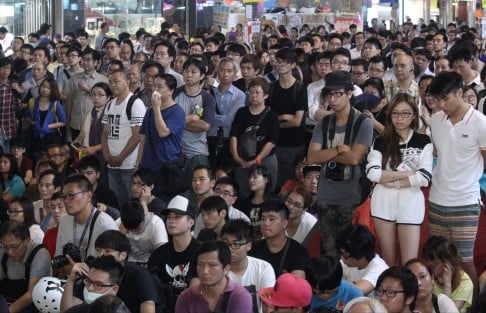
Protesters and passers-by listen to a live feed of the debate in Mong Kok. Photo: SCMP
6.50pm: Constitutional minister Raymond Tam addresses the students, saying he is also a University of Hong Kong alumnus.
“We all noticed that different organisations have conducted public opinion polls on the August 31 decision. The results show that there is no landslide view. There are people accepting and rejecting the decision.”
He cited some polls which suggested that 50 per cent of interviewees would accept the NPCSC framework for 2017.
6.47pm: Eason Chung of the Federation of Students challenges officials to go and ask the people on the street whether the government report on political development had truly reflected public views.
“That the government asked the people to pocket [the proposals] first means that the government has acknowledged that its proposals are not good enough,” said Chung.
6.45pm: Strong words from Yvonne Leung Lai-kwok:
“The HK people watching TV live will feel angry. It is the Hong Kong government who is giving up its responsibility. It has the constitutional duty to fight for a democratic reform proposal for Hong Kong and then pass it to the legislature to vote. You should not sit and do nothing just because NPCSC is involved in a later stage.
“Our debate should not focus on whether the NPCSC decision is unshakable. We should talk about the problem we are facing."
6.41pm: Rimsky Yuen, Secretary for Justice, says: “NPC is the top-level body. We have measured the issue that Yvonne mentioned. We think that when NPCSC decides whether the Basic Law needs to be amended, they can also decide how to amend it. The provisions should not be interpreted narrowly as you suggested."
He adds that Hong Kong is a special administrative region of China and that central government has the power and the need to get involved in the political reform of Hong Kong.
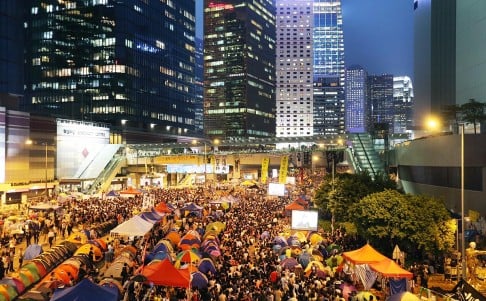
The scene in Tamar, where Alex Chow was given a round of applause as he spoke. Photo: SCMP
6.35pm: Yvonne Leung Lai-kwok, of the Federation of Students, says: “If the two hours of meeting has to be made meaningful, one thing should be made clear. You have repeatedly said that the NPCSC’s decision of August 31 is unshakable. But in fact it is not, constitutionally speaking."
She cites provisions from the Chinese Constitution that if an NPC decision is not appropriate, it has the power to cancel the decision.
Nathan Law, of the Federation of Students, says many of Hong Kong's social problems have their roots in the undemocratic system.
“The government report to the National People’s Congress Standing Committee is the source of the present political problem,” Law argues, adding that the condition that a chief executive candidate must "love the country and love Hong Kong" effectively stripped some people of their rights to stand for election."
6.30pm: Chief Secretary Carrie Lam says political developments must follow the Basic Law and that Beijing would have a role to play.
“Hong Kong is not an independent entity but only a special administrative region and cannot decide on its own its political development,” said Lam, adding that central government has a constitutional role to play in this respect.
She goes on to reject students' criticisms that police used excessive force against protesters, arguing that they had exercised restraint.
6.20pm: More from Alex Chow:
"The National People’s Congress Standing Committee has laid down a lot of rules… Secretary you just said whether it is a high threshold it is up to people to interpret. But Leung Chun-ying today has provided another answer."
Chow referred to Leung’s remarks in media interviews on the relationship between poverty and universal suffrage.
"An unequal nominating committee is no good to the wealth gap in Hong Kong. Should it continue to serve business conglomerates, won’t it continue to deprive the political rights of the one million people living in poverty?”


6.16pm: Alex Chow Yong-kang says: “Many people have expected this conversation for a long time. Hong Kong people feel that the society is sinking. They think they must come out to fight.
"In the past month, they have 'eaten' a lot of pepper spray, suffered the 87 cannisters of tear gas. They were forced to come out and fight in the streets in order for their voices to be heard."
Carrie Lam took nine minutes to complete her opening remarks - four minutes over the time allocated. Alex Chow has been given an extra five minutes to make his points.
6.10pm: Chief Secretary Carrie Lam says in her opening speech that students’ voices have been heard clearly by society, the government, and central government.
“However respectful one’s ideal is, it should be achieved by reasonable and lawful ways,” said Lam.
“It is not a debate contest,” she said, adding that she hoped there would be a meaningful exchange with the students and that she hoped dialogue could help ease between the two sides.
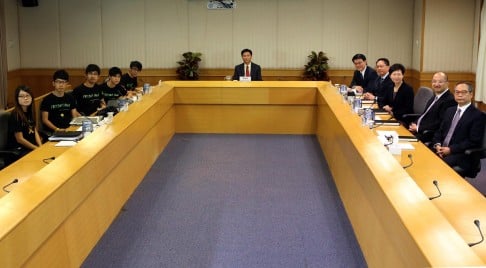
The scene in the debating chamber. Photo: SCMP
6pm: The talks have officially started, with moderator Leonard Cheng Kwok-hon laying down the ground rules. “I am the moderator. I am not invited to be the mediator to resolve disputes. The meeting is to discuss political reform,” he says.
5.50pm: The debate participants are all seated around the table and the press are taking photos. After more than three weeks of protests, we are now just minutes away from the start of the evening's talks.
An estimated 1,000 people are at the Admiralty protest site, while numbers have grown to around 80 in Causeway Bay.
In Mong Kok hopes of a breakthrough are not high in the protest zone.
"I don't have too high an expectation for tonight, just disappointment," said protester Cas Chan, 30. "Each side already knows what cards will be played by the other and I don't see how they will reach a conclusion given that the government stressed that it will not budge."
Scholarism member Agnes Chow Ting, who recently stepped down as spokesperson, was also in Mong Kok to rally support. "Whether or not you support or against the movement, I hope you can stay between 6pm to 8pm," she said. "Our goal is the same...we should be able to have the most basic of political rights."
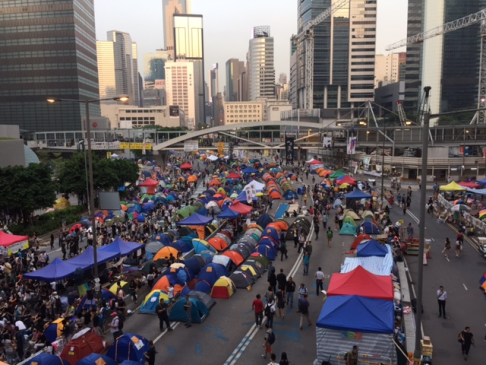
The scene in Admiralty just ahead of the debate. Photo: SCMP
5.40pm: CY Leung ruffled feathers last night when he suggested genuine universal suffrage would result in poorer people dominating politics in the territory.
"If it's entirely a numbers game and numeric representation, then obviously you’d be talking to the half of the people in Hong Kong who earn less than US$1,800 a month [HK$13,964.2],” Leung said in comments published by foreign newspapers.
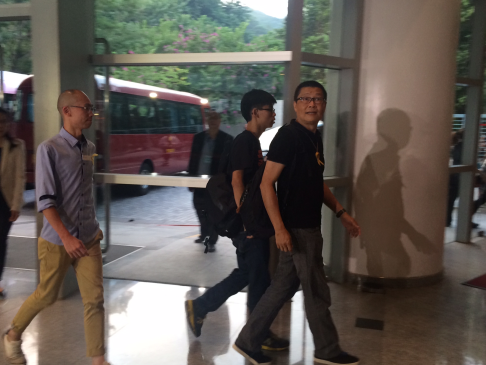
Occupy Central co-founder Dr Chan Kin-man and Scholarism leader Joshua Wong Chi-fung arrive at the debate venue. Photo: Jeffie Lam
5.30pm: All government officials, students and the chair of the debate, Professor Leonard Cheng Kwok-hon, have arrived at the Academy of Medicine, where the debate will be held.
Outside the Academy three Form Six students watched the two sides arrive.
Identifying themselves only by their surnames - Lau, Lam and Leung - they said they would go home to watch the debate on tleevision, but if it fails to bear any fruit they would consider returning to the Admiralty protest zone.
Occupy Central co-founder Dr Chan Kin-man and Scholarism leader Joshua Wong Chi-fung have just arrived.
5.20pm: This breaking news just in from Reuters, hinting that the government may be willing to make concessions to the protesters:
Hong Kong Chief Executive Leung Chun-ying said on Tuesday there was room for the committee that selects candidates for the territory’s 2017 election to be made "more democratic".
"There’s room for discussion there," Leung told a small group of journalists on Tuesday. "There’s room to make the nominating committee more democratic."
The comment was the first indication from Leung of a possible concession to pro-democracy protesters who have blocked streets around the Chinese-controlled city, a former British colony, for more than three weeks.
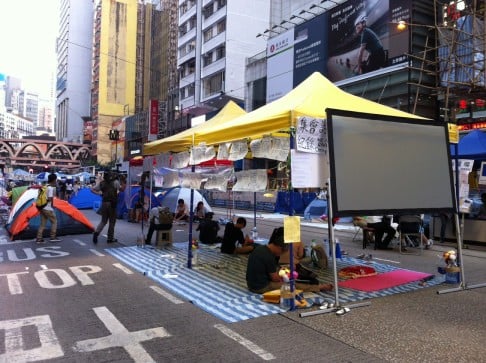
A big screen has been set up in the Causeway Bay protest zone. Photo: Raquel Carvalho
5pm: One hour to go until the debate starts and volunteers in Causeway Bay have set up a big screen on the street. The equipment was provided by a local film director, according to people at the scene.
At a daily police press briefing this afternoon reporters were again told Mong Kok is on the verge of a riot - despite two days of calm - as "radical protesters and troublemakers" are in the mix and may "incite others to charge the police cordon line".
4.45pm: Staff at the Citic Tower have removed almost all the metal barriers blocking the car park to the building, after the High Court ordered protesters to leave the area. Some defiant protesters are sitting on the remaining barricades and refusing to move. Earlier, a man who said he was a lawyer representing the building's tenants told protesters that if they stop the removal operations, they will be violating a court order.

Barriers are removed outside the Citic Tower. Photo: Alan Yu
4.35pm: What some members of the pro-government camp had to say this afternoon:
* Lawmaker Starry Lee Wai-king, from the Democratic Alliance for the Betterment and Progress of Hong Kong (DAB), also an Executive Council member, said she hoped the Occupy protest would end following this evening's meeting.
* Liberal Party leader James Tien Pei-chun said he hoped the talk tonight would bear good result, and urged protesters to obey the court’s injunction.
* Executive Council member Arthur Li Kwok-cheung said the talks tonight “would not solve all the problems” and urged the public not to expect a breakthrough following the debate. “Anyone has that kind of thinking is naïve,” he said.
4.20pm: Former Justice Secretary Wong Yan-lung and a number of other prominent Hong Kong figures have offered student protest leaders 'intensive training' ahead of their talks with government officials that begin at 6pm today, the Post has learned.
Wong, Democratic Party heavyweight Martin Lee Chu-ming SC and a group of constitutional law experts have offered advice from a legal perspective, while Dr Joseph Chan Cho-wai, a former head of the University of Hong Kong’s department of politics, has run through the political arguments.
Meanwhile more than 100 journalists - reporters, cameramen and photographers - have already arrived at the venue where the debate will kick off in just over an hour-and-a-half.
3.50pm: Who's who in tonight's debate? Click here to find out more about the 10 participants
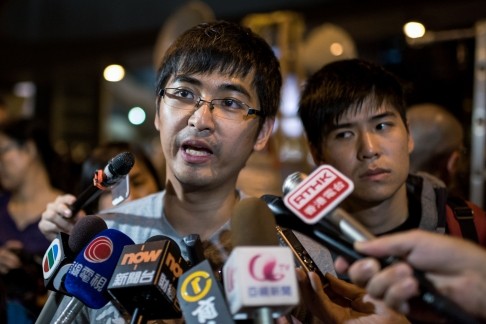
Alex Chow, secretary-general of the Federation of Students, will head the protester group. Photo: AFP
3.25pm: The Occupy movement has taken its toll on the popularity of Hong Kong's lawmakers, according to the University of Hong Kong's latest poll. Here are a few lines from a university press release today:
The latest survey showed that Jasper Tsang was the most popularly supported councillor attaining 58.5 marks. James To, Alan Leong and Regina Ip ranked the 2nd and 4th with 50.1, 44.8 and 44.6 marks correspondingly. The 5th to 7th ranks went to Lee Cheuk-yan, Emily Lau and Albert Ho who attained 43.3, 43.3 and 40.0 marks respectively. Leung Kwok-hung, Albert Chan and Wong Yuk-man ranked the 8th to 10th, attaining 39.9, 36.5 and 34.3 marks respectively.
The previous survey was conducted from July 14 to 17, 2014, while this survey was conducted from October 13 to 16, 2014.
Robert Ting-Yiu Chung, Director of Public Opinion Programme, observed, "The latest survey of top 10 Legislative Councillors shows that compared to three months ago, in terms of familiarity, Tam Yiu-chung who ranked sixth last time has dropped out of the 'top 10' list and replaced by James To. In terms of absolute ratings, the scores of 7 out of the 9 who stayed on the list have gone down, 1 has gone up and 1 remains unchanged.
Among them, the ratings of Regina Ip, Alan Leong, Emily Lau, Lee Cheuk-yan and Albert Ho have dropped beyond sampling errors. The first four have even dropped to their record lows since 2008, 2006, 1994 and 1995, meaning that the recent mass movement has taken its toll on councillors from all camps. In terms of relative rankings, Jasper Tsang continues to top the list, now for 7 consecutive times since April 2013.
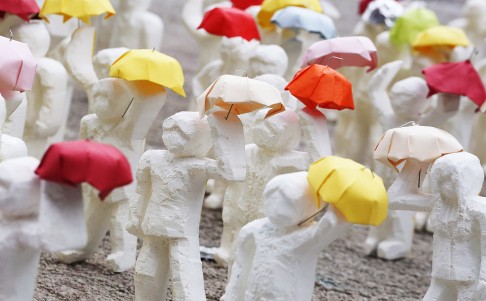
An model outside government headquarters shows figures holding umbrellas. Photo: Felix Wong
3.20pm: A few comments from folk at the protest zones today, on yesterday's injunction, tonight's debate and the effects of the protests on local business:
Dick Chiu, 30, works in transport sector and is protesting in Admiralty: "We'll definitely continue the protest elsewhere if this area gets cleared. CY Leung and the other top-ranking officials are holding a hardline stance so I'm not expecting much from the talks.
Aston Wong, who runs an accountancy firm in Mong Kok: "It is now the peak season for tax declaration and my employees usually have to work overtime till 9pm. Now they have to leave between 5pm and 6pm as many of them are worried about their safety. The protest site nearby got very chaotic, noisy and violent."
Pastor Bob Kraft, who has been giving pastoral guidance to protesters for the past three weeks, speaking in Admiralty: "I feel that the injunction is quite a large area... where do you define the area? There's not even a definition as to where the area is. As a member of the public, I'm very concerned about that."
Dawn Wong, 29, in Causeway Bay: "Risk is within my expectation when coming out to occupy. I am not deterred by contempt of court as from the first day [I knew] what I was doing is illegal."
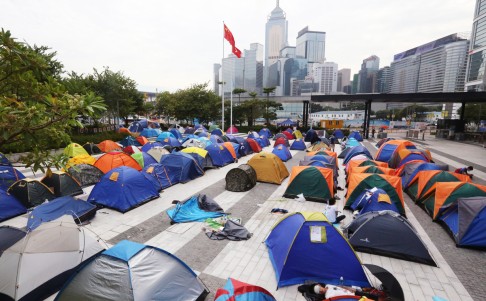
An orderly campsite outside Hong Kong's government offices. Photo: SCMP
3.10pm: Tonight's talks will be televised live, with the two sides given a total of 90 minutes to debate the democracy issues. Moderating the talks will be Lingnan University President Leonard Cheng Kwok-hon, an ex-adviser for CY Leung's election campaign. Despite his previous post, he has pledged to remain impartial and says he will ensure the two sides keep their arguments short to ensure a fair debate.
Media attending the talks, at the Hong Kong Academy of Medicine Jockey Club Building in Aberdeen, will watch proceedings from the Lim Por Yen Lecture Theatre via a live feed.
A government statement today outlined the details of those taking part on both sides:
On the government side will be the Task Force on Constitutional Development - the Chief Secretary for Administration, Mrs Carrie Lam; the Secretary for Justice, Mr Rimsky Yuen, SC; and the Secretary for Constitutional and Mainland Affairs, Mr Raymond Tam. Joining them will be the Director of the Chief Executive's Office, Mr Edward Yau, and the Under Secretary for Constitutional and Mainland Affairs, Mr Lau Kong-wah.
The HKFS will be represented by its Secretary-General, Mr Alex Chow; Deputy Secretary-General, Mr Lester Shum; and General Secretary, Mr Eason Chung, as well as Council Members Mr Nathan Law and Ms Yvonne Leung.
3pm: With the long-awaited debate between student protesters and government officials just a couple of hours away, here's a quick recap on events over the last 24 hours:
* Hong Kong's High Court orders protesters to leave roads in Admiralty and Mong Kok, while CY Leung hints that central government could intervene to clear the streets if the situation is unresolved. Read the full story here
* CY Leung tells foreign media that democracy in Hong Kong would result in the city's poor residents dominating election.
* 2,000 police will take to the streets tonight, force source tells the SCMP, to deal with any problems in the event that talks break down.
* Protester Ken Tsang, allegedly beaten by police officers in Tamar Park, to seek court order to reveal the names of his attackers.
OCCUPY CENTRAL - DAY 24: Full coverage of the day’s events
PUBLISHED : Tuesday, 21 October, 2014, 3:30pm
UPDATED : Tuesday, 21 October, 2014, 11:41pm
Staff Reporters
With the government insisting Beijing will not bow to protesters' demands, and students refusing to leave their demonstration zones until concessions have been made, the two sides remain deadlocked after an initial round of talks.
After the meeting, Chief Secretary Carrie Lam said the government would consider submitting a report to the Hong Kong and Macau Affairs Office about the public's reaction to the NPC Standing Committee's framework on political reform.
The Federation of Students' Alex Chow later described the talks as "vague" and said the government had not offered any concrete proposals in response to their demands for political reform by 2017.
______________________________________
11.30pm: That brings our live coverage to an end. Join us tomorrow morning for all the latest breaking news on the Occupy Central protests.
11.15pm Mong Kok: Federation of Students representatives Yvonne Leung Lai-kwok and Eason Chung Yiu-wah show up in Mong Kok to thank protesters for standing up for democratic values.
Leung criticises Justice Secretary Rimsky Yuen Kwok-keung, a fellow University of Hong Kong alumnus, for claiming to defend the rule of law at the expense of the public's demands for true democracy.
“The courts cannot solve a political problem, only the government can. But has anyone seen them come out to speak to the people?” says Leung, one of the five representatives at the talks with the government on today.
“At the talks with government officials today, I really wanted to say to Carrie Lam: ‘Long time no see’.”
Leung acknowledges that a court injunction had been issued for Mong Kok, putting protesters there at the risk of criminal proceeedings.
“All I can say is that we didn’t expect this ... But neither could I believe the Court of First Instance would be placed on the table [as a tool] by the government.”
Leung says she plans to remain at the Mong Kok camp for the rest of the movement until a consensus can be reached with the government.
“I hope everyone will stay here because we cannot simply allow the government in two hours, to use their sophistry ... and strip away the hard work we have achieved in the last twenty-something days.”
11pm Causeway Bay: About 150 people are watching a live broadcast of the Hong Kong Federation of Students' leaders giving speeches in Admiralty.
Some protesters criticise the fact that no mention was made about the Occupy sit-in taking place in Causeway Bay during the meeting between the students and representatives from the government.

10.30pm: An alliance of social welfare concern groups strongly criticises CY Leung’s recent comments about democratic reform in Hong Kong, saying they were discriminatory towards those in the city who earned less than HK$14,000 a month.
In the statement, the alliance accuse Leung of defending the interests of “foreign forces” by insisting on a political system that is biased towards large enterprises.
“We express our strong discontent and regret on the chief executive’s blatant neglect of the contributions made by Hong Kong’s lower income classes – which constitute the majority of the population – to the society and economy,” the statement read.
In the statement, the group urged the establishment of civil nominations for the 2017 chief executive's election and called for the abolition of functional constituencies in the Legislative Council to bring about an end to the current system - which it says “serves only big business”.
In an interview with overseas media on Monday, Chief Executive Leung Chun-ying said that if the government met pro-democracy protesters’ demands it would result in the city’s poorer people dominating any future elections.
During the interview, which was carried by the Wall Street Journal, the Financial Times and the International New York Times, the embattled chief executive reiterated his position that free elections were "impossible".
9.45pm: Some people in Hong Kong say the government had clearly stated its case and that the protests should end. Here are their views:
Robert Chow Yung, anti-Occupy activist from the Alliance for Peace and Democracy: “The government expressed its sincerity and it did what it could. But I can’t see students responding to that. I call on more people to … let the students know how upset they are [with the protests], and to show that Occupy does not represent the majority.”
Sammy Zhao, 40, mainland businessman: “Most people want a stable government and a stable economy. Of course I don't support [continued protests], because we are Chinese people and we should be united.”
Wyman Kung, 28, engineer and non-protester: “I admire the students’ persistence. I think they are brave and I appreciate their courage, but I think at this stage they should comply with the law and clear the roads."
9.40pm: Civic Party legislator Kenneth Chan Ka-lok says the talks are more like a “monologue”.
"I am very proud of our students. They eloquently expressed our demands for universal suffrage and the people's frustrations," he said. However, "I am very disappointed with the government. They didn't make an effort to address our concerns. They didn't even give reasons to people stop protesting.”
If nothing changes, Chan promised to veto the reform package. "As a political scientist I can't accept it as true universal suffrage,” Chan said.
Former Civic Party lawmaker Margaret Ng said the government responses were “empty and powerless” and dismissed the platform proposed by Carrie Lam as a delaying tactic.
She believes Occupy supporters would not retreat after the talks. Ng urged the government to hold a second dialogue with students as soon as possible.
9.20pm: Protesters and observers alike seem downbeat about a resolution to the stalemate. So what should be the next step? People sound off to SCMP reporters in the streets:
Kevin Ko, 32, insurance agent: “This was not even a dialogue. There was no interaction. Even if there are more meetings in the future I don't think it can be solved this way. We will have to keep occupying the streets.”
Andy Fong, 30, civil engineer: “The students performed well in the talks but I feel they weren’t aggressive enough … Students were facing tough opponents but they seemed to have forgotten about the bargaining chips they have on hand [the protest zones]. [Rimsky Yuen’s statement was also] not logical. Many people demand true universal suffrage, but may not take to the streets.”
Chan Wing-hung,18, Hong Kong Polytechnic University student: "The [government] didn't give any suggestions to improve the current situation. They didn't even guarantee that the NPC standing committee would receive the report. At least for this week, I think we should keep protesting.”
Eric Ma Kit-wai, Chinese University journalism scholar whose specialities include research on Hongkongers’ identity: “How the officials and police described the event [protests] is in such stark contrast to the experiences of those who have witnessed it first-hand. I was in Mong Kok and it was so peaceful. … How can we be convinced that the report would reflect the true views of Hongkongers if those who are going to compile it think in such a way?"
Alvin Leung, 29, watch salesman and non-protester: “They have been talking for so long, but I don’t know if it has any substance. The report to the State Council … and the proposed platform will be useless.”
Ming Lee, 20, student protester: “More dialogue will just waste everybody’s time. Talks like this will not get us anywhere. If she can muster the courage, [Carrie] Lam should come down [to Mong Kok] and talk to us directly.”

Chief Secretary Carrie Lam (centre) and government officials take questions from the media after the dialogue. Photo: Sam Tsang

Federation of Students leaders also face the press. Photo: Sam Tsang
9.05pm: Dialogue moderator Professor Leonard Cheng Kwok-hon, president of Lingnan University, gives an assessment of his performance, saying he tried to be "as fair as possible".
Asked why he took part in fielding questions to the students, Cheng said: "I only wanted to let students explain their stance in a detailed way, so that the officials can hear clearly and follow up."
8.45pm: It's now the students' turn for a press conference. The five Federation of Students representatives answered one question in Cantonese, about the prospect of another dialogue, before abruptly ending the session and walking away.
Foreign journalists' request for an English statement went unmet.
After about three minutes, the students reappeared. Federation deputy leader Lester Shum said, "[Leader] Alex [Chow] will now recap in English" – echoing a now-familiar phrase used by police spokesman Steve Hui.
Chow, the student group's secretary general, said they still needed to discuss with different groups and parties before formulating their next action.
He described the dialogue as peaceful, but the proposals put forward by the government were "kind of vague".
8.30pm: Carrie Lam faces questions about the platform's functions and if it will focus on post-2017 discussions, as pan-democrats have vowed to veto the government's upcoming proposal.
Lam says she hopes the platform will "help handle the long-term development of the city's political system, because the development after 2017 ... might need [plenty of] time to discuss and to find consensus".
She says they will discuss who will be invited to become members of the platform and whether it will be a permanent committee.
Constitutional affairs minister Raymond Tam adds that Hongkongers should not only focus on the 2017 chief executive election.
8.15pm: Government officials are now holding a press conference after the dialogue.
Chief Secretary Carrie Lam was asked whether the government's report would describe the "umbrella movement" as one of love and peace, or as a colour revolution. Lam said the report would "reflect public opinion ... And won't insert subjective descriptions".
Constitutional affairs minister Raymond Tam added that his bureau would file the report "in the most efficient way". "If there are public opinion surveys during this period of time, we will include them in the report," Tam said.
8.04pm: That's it, it's all over. Both sides are thanked for taking part.
During the two-hour dialogue Alex Chow spoke four times, while Nathan Law and Yvonne Leung spoke three times each. Eason Chung and Lester Shum spoke twice each.
On the government side, Carrie Lam spoke five times, and Rimsky Yuen and Raymond Tam spoke twice each. Edward Yau and Lau Kong-wah remained silent throughout.
8pm: “I hope you feel that the two-hour conversation has been constructive. No quarrels and no confrontation. I hope this is not the only time we meet," Carrie Lam tells the students.
“Maybe you are disappointed in what we said today, but we must obey the Basic Law, otherwise we will be taking the wrong path, waste our time and stick to where we’ve been.”
She adds: “I hope you have the courage and wisdom to think of a way out of the current situation. I hope you share the responsibility with us.”
She makes four points:
1. There is still ample room under the August 31 decision to work out a nomination procedure and election method for 2017. This will be the goal for the second round of public consultation.
2. The framework for 2017 is not final.
3. Students should help set up a platform to gauge views on the long-term constitutional development beyond 2017.
4. The government is considering how to make a report to central government to reflect people’s views.
7.56pm: Carrie Lam comments: “You cannot only have idealistic pursuits. You have to be pragmatic. I really can’t understand why Lester says the August 31 decision ‘kills democracy’. It gives ‘one person, one vote’. Isn’t it a big step forward?”
7.53pm: Alex Chow says Hongkongers have been fighting for more democracy for over 30 years, since the Sino-British talks.
He says the government is facing a governance crisis and warns it will not be eased if there is not a democratic system.
“Hongkong people have not heard of any solution,” says Chow.
He adds: “I met a student in Mong Kok the other day and he told me that he was prepared to face bullets. I like to ask what sort of government it is that forces people to risk facing bullets to fight for democracy.”
7.49pm: A powerful message from Lester Shum - but one which suggests deadlock.
“We have talked for one hour and 45 minutes. The single message we got is just that the government wants us to pocket the political reform proposal first and accept the nominating committee.
“Have we not made enough concessions? So many young people have sacrificed their studies and time. We are even willing to be arrested and go to jail. What do we want? The right to vote, the right to be voted and voter equally.
“Now the government is only telling us to pack up and go home. The whole generation, awakened by tear gas, cannot accept this. We are the generation chosen by times [to come forward]. I think the same applies to you - you are the officials chosen by times. Can you be responsible? Or will you will be the ones that kill our political future and be the sinners of a thousand years?"
7.46pm: Nathan Law is the first to make a concluding remark for the students: “Many people do not trust the government. It surprised us Leung Chun-ying said in media interviews that democracy would see more people dominate the vote.
"Amending the Basic Law is feasible and has its urgent need. I hope the government should not shun the challenge, and give us a timetable”.
Eason Chung of the Federation of Students adds that many legislators have vowed to veto the electoral proposals when they were tabled to the legislature and criticises the government for ignoring public opinions.
“We hope the government can propose a way to resolve the present situation. We are here to tell you what the public wants and what the public views are, not for you to persuade us to accept you,” said Chung.
7.38pm: Carrie Lam makes a suggestion:
“The 2017 [election] is not the destination. We can still improve the system for 2022. If all the pubic opinion being expressed can be recorded and reflected to the central government, it will be good for the democratic development.”
She proposes "a platform for multiple fronts” to gather views on political reform, but does not specify how that may happen.
7.36pm: Secretary for Constitutional and Mainland Affairs, Raymond Tam, hints at exploring the possibility of having a “systemic channel” for the public to express their views on various chief executive candidates for the reference of the nominating committee members.
He said it would be among the ideas to be explored in the upcoming second round of public consultation of the political reforms.
Carrie Lam reiterates that public nomination is not feasible under the law.
She asks the students: “Have you had chance to meet and communicate with pro-establishment lawmakers? I believe it is not realistic to think a proposal for public nomination can be passed by the legislature."
7.33pm: Hong Kong's government has released a statement after CY Leung's earlier remarks on the composition of the nominating committee. Here it is in full:
In response to some overseas media reports on the remarks made by the Chief Executive, Mr C Y Leung, yesterday (October 20) on the composition of the Nominating Committee, the Chief Executive's Office today (October 21) issued the following statement:
"There has been much comment about the Chief Executive's remarks to some overseas media yesterday (October 20) on what is meant by a 'broadly representative' Nominating Committee for the election of the Chief Executive by universal suffrage. Once again we must look to the Basic Law to provide the broader context and the legal reality.
"Hong Kong has a constitutional requirement to form a 'broadly representative' Nominating Committee as part of the process to elect the Chief Executive by universal suffrage. This has been in the Basic Law since 1990.
"Within this constitutional and legal framework, 'broadly representative' is not just a question of absolute numbers; it is also a question of taking into account the needs and priorities of a broad range of sectors as much as we can. By taking our lead from the current 1,200-member Election Committee we can see this includes a diverse range of sub-sectors such as catering, finance, import and export, transport, legal, medical, education, social welfare, agriculture and fisheries, sports and performing arts, religious groups and political representatives. At the briefing yesterday, the Chief Executive referred to the importance of these sectors, despite the fact that some of them are very small.
"The Chief Executive also shared his campaign experience to point out that any potential Chief Executive candidates must, therefore, spend time and energy trying to cultivate support in as many of these sub-sectors as possible to satisfy the requirement of being nominated by a 'broadly representative' group. Of course, any nominated candidate in a universal suffrage election in Hong Kong will have to win the greatest number of votes to be elected."
7.30pm: Rimsky Yuen draws a comparison to the minimum wage issue.
“Let me make a comparison… When we talked about minimum wage legislation back in time, some people wanted the wage to be set at HK$30 per hour, and some wanted HK$32.5.
“If people had said no legislation unless they got HK$50 an hour, would we still have the minimum wage now?
“So when we deal with a controversial issue, we, as a responsible government, have to consider views of different people. I hope when you strive for democracy, you also note that democracy is about diversity and the need to compromise."
“I believe people sitting at home - not in Mong Kok or Admiralty - do not insist on public nomination. If you still insist, you talk democracy but you do practise it.”
Alex Chow Yong-kang asks why the government cannot amend the Basic Law, if the popular demand for public nomination does not fit it.
He also pushes for an immediate solution to the current deadlock.
7.25pm: Secretary for Justice, Rimsky Yuen, says: “I bet all Hong Kong people want to see 'one person, one vote’ in 2017."
He drops a note on the four sectors that comprise the Election Committee, which picked the current chief executive and will also form the structure of the nominating committee in 2017.
“The four sectors were not proposed by the central government, but by some local sectors who did not want to see one sector dominating the system."
Meanwhile, on social media, Occupy supporters have expressed their surprise over the government representatives' decision to address students by their English-language first names, while students have formally addressed their counterparts. Some say they perceive the decision as condescending.
7.22pm: As the debate continues, many of those listening to live broadcasts on the streets don’t seem optimistic about the political deadlock easing. Here is what people are telling SCMP reporters:
Toby Wong, 28, kindergarten teacher: “Yvonne [Leung Lai-kwok] said that if only candidates who ‘love China’ were able to join, that would mean only pro-Beijing candidates could run in the election. Then Carrie Lam replied that … [Leung’s] definition was too narrow. Yet she didn’t give suggestions as to how it should be defined.”
Jason Tsang, 28, clerk: “The government representatives are human recorders. They are just spitting out gibberish.”
Janet Ho, human resources worker: “Finding the solutions that reflect the will of the people should be the government’s responsibility. I’m not optimistic that the talks will produce anything concrete. They are just repeating the same old arguments, and their strategy will be to drag this on.”
Sin Man-shun, 64, retired: “They are no closer to reaching a consensus. The officials keep stressing the illegality of what the protesters are doing, but they have not addressed why they have been pushed to do something illegal. The government is clamping down on future freedoms … and they won’t admit to it no matter what.”
Cas Chan, 30, photographer: “I don’t have too high an expectation for tonight – just disappointment. Each side already knows what cards will be played by the other.”
Chow Wing-sze, 19, university student: “I won’t accept anything short of civic nominations, but making this come true is difficult. Hopefully they will at least adjust the nomination committee to make it fairer.”

7.20pm: Secretary for Constitutional and Mainland Affairs, Raymond Tam, agrees the political system should not screen out some candidates because of their political stance, but says: “We should not mix up the design of the electoral system with the political power of candidates.”
He cited as an example the fact that pan-democrats Albert Ho and Alan Leong had been chief executive candidates in previous elections, while another pan-democrat, Lee Wing-tat, could not win enough nominations from the Election Committee to become a candidate.
“There had not been any change in the electoral system. But some people could become candidates, some could not,” said Tam.
7.17pm: Viewers in Admiralty and Mong Kok watch the debate:



7.10pm: As the clock ticks on, the tone of the debate remains civilised. Both sides appear to be well-prepared in their arguments and no one has yet interrupted an opposing speaker.
No one has so far been interrupted in the debate.
Carrie Lam says: “Political reform is a complicated and sensitive topic. The society has very many different views. We cannot do things all over again because only one side of view objects to [the NPCSC’s decision].”
Lam cited the anti-Occupy signature campaign which drew about one million signatures in support of the NPCSC decision.
She goes on to say: "It’s difficult to accept your accusations that we have submitted a superficial report to the NPCSC. The NPCSC is fully aware of the diverse views in Hong Kong.” She says the government will not submit another report to the NPCSC - one of the students' key demands.
However, she says the Hong Kong government will make a report to the State Councils’s Hong Kong and Macao Affairs Office to “reflect what has happened in Hong Kong - concerns of different sectors”, because, "Occupy is a big matter”.
7pm: We're at the halfway mark now.
Moderator Cheng has asked students to say what the officials should do to satisfy them.
Nathan Law says: “Will you, Secretaries, accurately reflect the public opinion to the central government?”
Law also says any restrictions imposed on the right to vote and right to be voted, due to a difference in political beliefs, would be unconstitutional.
“When you are aware that the formation methods of the chief executive election and the Legislative Council fall short of people’s expectations, why don’t you do something?" he asks. "You can do something under the constitutional framework. Also think of how to pull the society together which has been torn part by the reform."
Cheng describes Law’s comments as “very good”.
6.59pm: Lester Shum of Federation of Students says they are disappointed that the government has so far only asked the people to accept the National People’s Congress standing committee’s ruling.
“We have heard nothing from the government on how to solve the [current] political problem,” Shum says., adding that while the students appreciate the importance of upholding the rule of law, the law "should be written for the people, not [be] a tool to repress the people".
6.56pm: Raymond Tam Chi-yuen gets personal:
“Today, Eason and I may not have the right to vote for the chief executive. I have worked on the chief executive election three times but I also don’t have the right to vote. But there will be progress [under the August 31 framework].”
Tam says under the reform for “one person, one vote”, there won’t be" government-business collusion” because the chief executive will have to be accountable to all.
“I have worked in the chief executive's office. I have witnessed how a life of a chief executive is. I have learnt how to strike a balance after hearing voices on both sides. This is our conscience and our duty. Please don’t just ask whether government officials have a conscience. We also care about dignity and professionalism."

Protesters and passers-by listen to a live feed of the debate in Mong Kok. Photo: SCMP
6.50pm: Constitutional minister Raymond Tam addresses the students, saying he is also a University of Hong Kong alumnus.
“We all noticed that different organisations have conducted public opinion polls on the August 31 decision. The results show that there is no landslide view. There are people accepting and rejecting the decision.”
He cited some polls which suggested that 50 per cent of interviewees would accept the NPCSC framework for 2017.
6.47pm: Eason Chung of the Federation of Students challenges officials to go and ask the people on the street whether the government report on political development had truly reflected public views.
“That the government asked the people to pocket [the proposals] first means that the government has acknowledged that its proposals are not good enough,” said Chung.
6.45pm: Strong words from Yvonne Leung Lai-kwok:
“The HK people watching TV live will feel angry. It is the Hong Kong government who is giving up its responsibility. It has the constitutional duty to fight for a democratic reform proposal for Hong Kong and then pass it to the legislature to vote. You should not sit and do nothing just because NPCSC is involved in a later stage.
“Our debate should not focus on whether the NPCSC decision is unshakable. We should talk about the problem we are facing."
6.41pm: Rimsky Yuen, Secretary for Justice, says: “NPC is the top-level body. We have measured the issue that Yvonne mentioned. We think that when NPCSC decides whether the Basic Law needs to be amended, they can also decide how to amend it. The provisions should not be interpreted narrowly as you suggested."
He adds that Hong Kong is a special administrative region of China and that central government has the power and the need to get involved in the political reform of Hong Kong.

The scene in Tamar, where Alex Chow was given a round of applause as he spoke. Photo: SCMP
6.35pm: Yvonne Leung Lai-kwok, of the Federation of Students, says: “If the two hours of meeting has to be made meaningful, one thing should be made clear. You have repeatedly said that the NPCSC’s decision of August 31 is unshakable. But in fact it is not, constitutionally speaking."
She cites provisions from the Chinese Constitution that if an NPC decision is not appropriate, it has the power to cancel the decision.
Nathan Law, of the Federation of Students, says many of Hong Kong's social problems have their roots in the undemocratic system.
“The government report to the National People’s Congress Standing Committee is the source of the present political problem,” Law argues, adding that the condition that a chief executive candidate must "love the country and love Hong Kong" effectively stripped some people of their rights to stand for election."
6.30pm: Chief Secretary Carrie Lam says political developments must follow the Basic Law and that Beijing would have a role to play.
“Hong Kong is not an independent entity but only a special administrative region and cannot decide on its own its political development,” said Lam, adding that central government has a constitutional role to play in this respect.
She goes on to reject students' criticisms that police used excessive force against protesters, arguing that they had exercised restraint.
6.20pm: More from Alex Chow:
"The National People’s Congress Standing Committee has laid down a lot of rules… Secretary you just said whether it is a high threshold it is up to people to interpret. But Leung Chun-ying today has provided another answer."
Chow referred to Leung’s remarks in media interviews on the relationship between poverty and universal suffrage.
"An unequal nominating committee is no good to the wealth gap in Hong Kong. Should it continue to serve business conglomerates, won’t it continue to deprive the political rights of the one million people living in poverty?”


6.16pm: Alex Chow Yong-kang says: “Many people have expected this conversation for a long time. Hong Kong people feel that the society is sinking. They think they must come out to fight.
"In the past month, they have 'eaten' a lot of pepper spray, suffered the 87 cannisters of tear gas. They were forced to come out and fight in the streets in order for their voices to be heard."
Carrie Lam took nine minutes to complete her opening remarks - four minutes over the time allocated. Alex Chow has been given an extra five minutes to make his points.
6.10pm: Chief Secretary Carrie Lam says in her opening speech that students’ voices have been heard clearly by society, the government, and central government.
“However respectful one’s ideal is, it should be achieved by reasonable and lawful ways,” said Lam.
“It is not a debate contest,” she said, adding that she hoped there would be a meaningful exchange with the students and that she hoped dialogue could help ease between the two sides.

The scene in the debating chamber. Photo: SCMP
6pm: The talks have officially started, with moderator Leonard Cheng Kwok-hon laying down the ground rules. “I am the moderator. I am not invited to be the mediator to resolve disputes. The meeting is to discuss political reform,” he says.
5.50pm: The debate participants are all seated around the table and the press are taking photos. After more than three weeks of protests, we are now just minutes away from the start of the evening's talks.
An estimated 1,000 people are at the Admiralty protest site, while numbers have grown to around 80 in Causeway Bay.
In Mong Kok hopes of a breakthrough are not high in the protest zone.
"I don't have too high an expectation for tonight, just disappointment," said protester Cas Chan, 30. "Each side already knows what cards will be played by the other and I don't see how they will reach a conclusion given that the government stressed that it will not budge."
Scholarism member Agnes Chow Ting, who recently stepped down as spokesperson, was also in Mong Kok to rally support. "Whether or not you support or against the movement, I hope you can stay between 6pm to 8pm," she said. "Our goal is the same...we should be able to have the most basic of political rights."

The scene in Admiralty just ahead of the debate. Photo: SCMP
5.40pm: CY Leung ruffled feathers last night when he suggested genuine universal suffrage would result in poorer people dominating politics in the territory.
"If it's entirely a numbers game and numeric representation, then obviously you’d be talking to the half of the people in Hong Kong who earn less than US$1,800 a month [HK$13,964.2],” Leung said in comments published by foreign newspapers.

Occupy Central co-founder Dr Chan Kin-man and Scholarism leader Joshua Wong Chi-fung arrive at the debate venue. Photo: Jeffie Lam
5.30pm: All government officials, students and the chair of the debate, Professor Leonard Cheng Kwok-hon, have arrived at the Academy of Medicine, where the debate will be held.
Outside the Academy three Form Six students watched the two sides arrive.
Identifying themselves only by their surnames - Lau, Lam and Leung - they said they would go home to watch the debate on tleevision, but if it fails to bear any fruit they would consider returning to the Admiralty protest zone.
Occupy Central co-founder Dr Chan Kin-man and Scholarism leader Joshua Wong Chi-fung have just arrived.
5.20pm: This breaking news just in from Reuters, hinting that the government may be willing to make concessions to the protesters:
Hong Kong Chief Executive Leung Chun-ying said on Tuesday there was room for the committee that selects candidates for the territory’s 2017 election to be made "more democratic".
"There’s room for discussion there," Leung told a small group of journalists on Tuesday. "There’s room to make the nominating committee more democratic."
The comment was the first indication from Leung of a possible concession to pro-democracy protesters who have blocked streets around the Chinese-controlled city, a former British colony, for more than three weeks.

A big screen has been set up in the Causeway Bay protest zone. Photo: Raquel Carvalho
5pm: One hour to go until the debate starts and volunteers in Causeway Bay have set up a big screen on the street. The equipment was provided by a local film director, according to people at the scene.
At a daily police press briefing this afternoon reporters were again told Mong Kok is on the verge of a riot - despite two days of calm - as "radical protesters and troublemakers" are in the mix and may "incite others to charge the police cordon line".
4.45pm: Staff at the Citic Tower have removed almost all the metal barriers blocking the car park to the building, after the High Court ordered protesters to leave the area. Some defiant protesters are sitting on the remaining barricades and refusing to move. Earlier, a man who said he was a lawyer representing the building's tenants told protesters that if they stop the removal operations, they will be violating a court order.

Barriers are removed outside the Citic Tower. Photo: Alan Yu
4.35pm: What some members of the pro-government camp had to say this afternoon:
* Lawmaker Starry Lee Wai-king, from the Democratic Alliance for the Betterment and Progress of Hong Kong (DAB), also an Executive Council member, said she hoped the Occupy protest would end following this evening's meeting.
* Liberal Party leader James Tien Pei-chun said he hoped the talk tonight would bear good result, and urged protesters to obey the court’s injunction.
* Executive Council member Arthur Li Kwok-cheung said the talks tonight “would not solve all the problems” and urged the public not to expect a breakthrough following the debate. “Anyone has that kind of thinking is naïve,” he said.
4.20pm: Former Justice Secretary Wong Yan-lung and a number of other prominent Hong Kong figures have offered student protest leaders 'intensive training' ahead of their talks with government officials that begin at 6pm today, the Post has learned.
Wong, Democratic Party heavyweight Martin Lee Chu-ming SC and a group of constitutional law experts have offered advice from a legal perspective, while Dr Joseph Chan Cho-wai, a former head of the University of Hong Kong’s department of politics, has run through the political arguments.
Meanwhile more than 100 journalists - reporters, cameramen and photographers - have already arrived at the venue where the debate will kick off in just over an hour-and-a-half.
3.50pm: Who's who in tonight's debate? Click here to find out more about the 10 participants

Alex Chow, secretary-general of the Federation of Students, will head the protester group. Photo: AFP
3.25pm: The Occupy movement has taken its toll on the popularity of Hong Kong's lawmakers, according to the University of Hong Kong's latest poll. Here are a few lines from a university press release today:
The latest survey showed that Jasper Tsang was the most popularly supported councillor attaining 58.5 marks. James To, Alan Leong and Regina Ip ranked the 2nd and 4th with 50.1, 44.8 and 44.6 marks correspondingly. The 5th to 7th ranks went to Lee Cheuk-yan, Emily Lau and Albert Ho who attained 43.3, 43.3 and 40.0 marks respectively. Leung Kwok-hung, Albert Chan and Wong Yuk-man ranked the 8th to 10th, attaining 39.9, 36.5 and 34.3 marks respectively.
The previous survey was conducted from July 14 to 17, 2014, while this survey was conducted from October 13 to 16, 2014.
Robert Ting-Yiu Chung, Director of Public Opinion Programme, observed, "The latest survey of top 10 Legislative Councillors shows that compared to three months ago, in terms of familiarity, Tam Yiu-chung who ranked sixth last time has dropped out of the 'top 10' list and replaced by James To. In terms of absolute ratings, the scores of 7 out of the 9 who stayed on the list have gone down, 1 has gone up and 1 remains unchanged.
Among them, the ratings of Regina Ip, Alan Leong, Emily Lau, Lee Cheuk-yan and Albert Ho have dropped beyond sampling errors. The first four have even dropped to their record lows since 2008, 2006, 1994 and 1995, meaning that the recent mass movement has taken its toll on councillors from all camps. In terms of relative rankings, Jasper Tsang continues to top the list, now for 7 consecutive times since April 2013.

An model outside government headquarters shows figures holding umbrellas. Photo: Felix Wong
3.20pm: A few comments from folk at the protest zones today, on yesterday's injunction, tonight's debate and the effects of the protests on local business:
Dick Chiu, 30, works in transport sector and is protesting in Admiralty: "We'll definitely continue the protest elsewhere if this area gets cleared. CY Leung and the other top-ranking officials are holding a hardline stance so I'm not expecting much from the talks.
Aston Wong, who runs an accountancy firm in Mong Kok: "It is now the peak season for tax declaration and my employees usually have to work overtime till 9pm. Now they have to leave between 5pm and 6pm as many of them are worried about their safety. The protest site nearby got very chaotic, noisy and violent."
Pastor Bob Kraft, who has been giving pastoral guidance to protesters for the past three weeks, speaking in Admiralty: "I feel that the injunction is quite a large area... where do you define the area? There's not even a definition as to where the area is. As a member of the public, I'm very concerned about that."
Dawn Wong, 29, in Causeway Bay: "Risk is within my expectation when coming out to occupy. I am not deterred by contempt of court as from the first day [I knew] what I was doing is illegal."

An orderly campsite outside Hong Kong's government offices. Photo: SCMP
3.10pm: Tonight's talks will be televised live, with the two sides given a total of 90 minutes to debate the democracy issues. Moderating the talks will be Lingnan University President Leonard Cheng Kwok-hon, an ex-adviser for CY Leung's election campaign. Despite his previous post, he has pledged to remain impartial and says he will ensure the two sides keep their arguments short to ensure a fair debate.
Media attending the talks, at the Hong Kong Academy of Medicine Jockey Club Building in Aberdeen, will watch proceedings from the Lim Por Yen Lecture Theatre via a live feed.
A government statement today outlined the details of those taking part on both sides:
On the government side will be the Task Force on Constitutional Development - the Chief Secretary for Administration, Mrs Carrie Lam; the Secretary for Justice, Mr Rimsky Yuen, SC; and the Secretary for Constitutional and Mainland Affairs, Mr Raymond Tam. Joining them will be the Director of the Chief Executive's Office, Mr Edward Yau, and the Under Secretary for Constitutional and Mainland Affairs, Mr Lau Kong-wah.
The HKFS will be represented by its Secretary-General, Mr Alex Chow; Deputy Secretary-General, Mr Lester Shum; and General Secretary, Mr Eason Chung, as well as Council Members Mr Nathan Law and Ms Yvonne Leung.
3pm: With the long-awaited debate between student protesters and government officials just a couple of hours away, here's a quick recap on events over the last 24 hours:
* Hong Kong's High Court orders protesters to leave roads in Admiralty and Mong Kok, while CY Leung hints that central government could intervene to clear the streets if the situation is unresolved. Read the full story here
* CY Leung tells foreign media that democracy in Hong Kong would result in the city's poor residents dominating election.
* 2,000 police will take to the streets tonight, force source tells the SCMP, to deal with any problems in the event that talks break down.
* Protester Ken Tsang, allegedly beaten by police officers in Tamar Park, to seek court order to reveal the names of his attackers.
Re: China blocks bbc website after video shows hong kong police beating protester
Talks fail to narrow gap between student leaders and government
Chief secretary's vow during televised talks to submit report to Beijing reflecting public's views of 2017 poll framework fails to please protesters
PUBLISHED : Tuesday, 21 October, 2014, 11:39pm
UPDATED : Tuesday, 21 October, 2014, 11:39pm
Staff Reporters
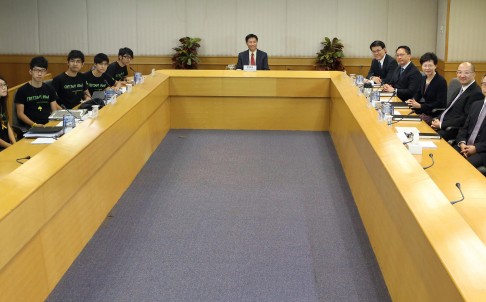
Leaders from the Federation of Students meet Chief Secretary Carrie Lam and other government representatives in the city's first face-to-face dialogue between top officials and activists.Photo: K. Y. Cheng
The government and student leaders remained poles apart on how the city should elect its leader in 2017, after their televised meeting yesterday failed to resolve the issue that triggered the Occupy Central mass sit-ins.
Chief Secretary Carrie Lam Cheng Yuet-ngor said the government would submit a report to Beijing reflecting the latest public sentiment and would consider setting up a platform for dialogue on constitutional development, but that failed to please the five leaders from the Federation of Students.
Lam and fellow officials ruled out the possibility of reversing the National People's Congress Standing Committee's August decision imposing tight limits on the 2017 election. They also rejected the students' demand for public nomination of candidates.
Federation leaders told protesters after the meeting that they would not retreat from the protest sites as the government had not given any concrete response.
Lam said the government respected the students' passion in pursuing democracy, but added: "However respectful one's ideal is, it should be achieved by reasonable and lawful ways."
Tens of thousands of people at the protest sites in Admiralty, Causeway Bay and Mong Kok tuned in to the televised talks - the first face-to-face dialogue between top officials and activists in the city's history.
The talks received wide coverage in broadcasts by mainland and overseas news organisations. CCTV's 24-hour news channel ran a few minutes of the debate live. Sina.com ran a live text broadcast of officials', but not students' statements. Over two hours, both sides negotiated in a relatively cordial atmosphere.
Lam said the government would submit a report to the State Council's Hong Kong and Macau Affairs Office to "reflect what had happened in Hong Kong and the concerns of different sectors" since the Standing Committee announced only two or three candidates could run and must win majority support from a 1,200-strong nominating committee.
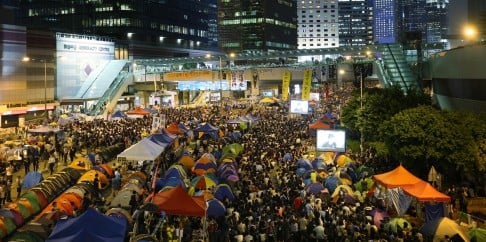
Protesters watch the talks being broadcast live in Admiralty.
"The report will serve as a crucial reference for constitutional development in future and will be conducive to democratic development," she said.
The government would also explore the possibility of setting up a platform for dialogue among the government, students and other interested parties on constitutional development beyond 2017, she said.
Lam stressed arrangements for electing the city's leader could be amended after universal suffrage was attained in 2017. There was room to make the election more democratic within the restrictive framework, she said.
Hong Kong was not an independent entity, but only a special administrative region, she said. "It cannot decide on its own its political development."
At the end of the talks, Lam said they had been constructive. "There was no quarrel and no confrontation. I hope this is not the only time we meet."
The federation's deputy secretary general, Lester Shum, rejected Lam's calls for the protesters end their sit-in and accept Beijing's ruling.
"Have we not made enough concessions? So many young people … are even willing to go to jail," he said. "What do we want? The right to vote and the right to stand in election. Now the government is only telling us to pack up and go home."
Occupy co-organiser Benny Tai Yiu-ting said protesters would not accept the government's response.
The new report should be submitted to the NPC Standing Committee rather than the State Council so that it could retract its August decision, he said. And the dialogue platform should deal with reform for the 2017 poll, he added.
Protesters in Admiralty said submitting a new report raised more questions than answers.
"What kind of public opinions are you expecting Lam to include in the report," Siu Chi-yan, a second-year student at the Academy of Performing Arts, asked.
Tony Cheung, Jeffie Lam, Gary Cheung, Joyce Ng, Ng Kang-chung, Peter So and Amy Nip
Talks fail to narrow gap between student leaders and government
Chief secretary's vow during televised talks to submit report to Beijing reflecting public's views of 2017 poll framework fails to please protesters
PUBLISHED : Tuesday, 21 October, 2014, 11:39pm
UPDATED : Tuesday, 21 October, 2014, 11:39pm
Staff Reporters

Leaders from the Federation of Students meet Chief Secretary Carrie Lam and other government representatives in the city's first face-to-face dialogue between top officials and activists.Photo: K. Y. Cheng
The government and student leaders remained poles apart on how the city should elect its leader in 2017, after their televised meeting yesterday failed to resolve the issue that triggered the Occupy Central mass sit-ins.
Chief Secretary Carrie Lam Cheng Yuet-ngor said the government would submit a report to Beijing reflecting the latest public sentiment and would consider setting up a platform for dialogue on constitutional development, but that failed to please the five leaders from the Federation of Students.
Lam and fellow officials ruled out the possibility of reversing the National People's Congress Standing Committee's August decision imposing tight limits on the 2017 election. They also rejected the students' demand for public nomination of candidates.
Federation leaders told protesters after the meeting that they would not retreat from the protest sites as the government had not given any concrete response.
Lam said the government respected the students' passion in pursuing democracy, but added: "However respectful one's ideal is, it should be achieved by reasonable and lawful ways."
Tens of thousands of people at the protest sites in Admiralty, Causeway Bay and Mong Kok tuned in to the televised talks - the first face-to-face dialogue between top officials and activists in the city's history.
The talks received wide coverage in broadcasts by mainland and overseas news organisations. CCTV's 24-hour news channel ran a few minutes of the debate live. Sina.com ran a live text broadcast of officials', but not students' statements. Over two hours, both sides negotiated in a relatively cordial atmosphere.
Lam said the government would submit a report to the State Council's Hong Kong and Macau Affairs Office to "reflect what had happened in Hong Kong and the concerns of different sectors" since the Standing Committee announced only two or three candidates could run and must win majority support from a 1,200-strong nominating committee.

Protesters watch the talks being broadcast live in Admiralty.
"The report will serve as a crucial reference for constitutional development in future and will be conducive to democratic development," she said.
The government would also explore the possibility of setting up a platform for dialogue among the government, students and other interested parties on constitutional development beyond 2017, she said.
Lam stressed arrangements for electing the city's leader could be amended after universal suffrage was attained in 2017. There was room to make the election more democratic within the restrictive framework, she said.
Hong Kong was not an independent entity, but only a special administrative region, she said. "It cannot decide on its own its political development."
At the end of the talks, Lam said they had been constructive. "There was no quarrel and no confrontation. I hope this is not the only time we meet."
The federation's deputy secretary general, Lester Shum, rejected Lam's calls for the protesters end their sit-in and accept Beijing's ruling.
"Have we not made enough concessions? So many young people … are even willing to go to jail," he said. "What do we want? The right to vote and the right to stand in election. Now the government is only telling us to pack up and go home."
Occupy co-organiser Benny Tai Yiu-ting said protesters would not accept the government's response.
The new report should be submitted to the NPC Standing Committee rather than the State Council so that it could retract its August decision, he said. And the dialogue platform should deal with reform for the 2017 poll, he added.
Protesters in Admiralty said submitting a new report raised more questions than answers.
"What kind of public opinions are you expecting Lam to include in the report," Siu Chi-yan, a second-year student at the Academy of Performing Arts, asked.
Tony Cheung, Jeffie Lam, Gary Cheung, Joyce Ng, Ng Kang-chung, Peter So and Amy Nip
HK Govt. host televised talk with citizens rep. PAP balless with Roy & HHH
What is PAP hiding ? Televised Q&A will exposed PAP fallacies in CPF?
If not (no answers to Roy) ,why not?
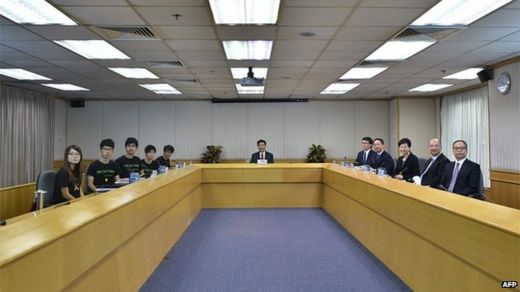
What is PAP hiding ? Televised Q&A will exposed PAP fallacies in CPF?
If not (no answers to Roy) ,why not?

Re: HK Govt. host televised talk with citizens rep. PAP balless with Roy & HHH
Aiyah, don't talk about live telecast lah.
Not even dare to have a delayed (ie edited) telecast.
Worse, now NEA cancel all applications by HH.
Huat ah!
Aiyah, don't talk about live telecast lah.
Not even dare to have a delayed (ie edited) telecast.
Worse, now NEA cancel all applications by HH.
Huat ah!
Re: HK Govt. host televised talk with citizens rep. PAP balless with Roy & HHH
the difference is the 5 student council in hong kong has got 100,000 hong kong students backing them up and ready for tiananmen square anytime.
while in Singapore its just Roy ngergn and one spastic bitch from malaysia Han Hui Hui if they go on television.
the difference is the 5 student council in hong kong has got 100,000 hong kong students backing them up and ready for tiananmen square anytime.
while in Singapore its just Roy ngergn and one spastic bitch from malaysia Han Hui Hui if they go on television.
HK's Leung: Ass Loon & Daddy Taught me Not to Trust StewPIG Peasants!
Old Fart inherited a more or less democratic Westminster system
But he did not trust the peasants who according to him are StewPIG
"Innovations" like GRCs, absolute control of media, biased civil servants
Gerrymandering and a thousand and one other tricks were implemented
Now Ass Loon and Daddy want to teach Evil Leung how to replicate it
HONG KONG — The Beijing-appointed leader of Hong Kong, Leung Chun-ying, said Monday evening that it was unacceptable to allow his successors to be chosen in open elections, in part because doing so would risk giving poorer residents a dominant voice in politics.
Mr. Leung made the statement during a broad-ranging defense of his administration’s handling of pro-democracy protests that have disrupted the city for more than three weeks.
In an interview with a small group of journalists from American and European news media organizations, his first with foreign media since the city erupted in demonstrations, he acknowledged that many of the protesters are angry over the lack of social mobility and affordable housing in the city. But he argued that containing populist pressures was an important reason for resisting the protesters’ demands for fully open elections.
Instead, he backed Beijing’s position that all candidates to succeed him as chief executive, the top post in the city, must be screened by a “broadly representative” nominating committee appointed by Beijing. That screening, he said, would insulate candidates from popular pressure to create a welfare state, and would allow the city government to follow more business-friendly policies to address economic inequality instead.
Mr. Leung’s blunt remarks reflect a widely held view among the Hong Kong elite that the general public cannot be trusted to govern the city well. His statements appeared likely to draw fresh criticism from the democratic opposition, and to inflame the street struggle over Hong Kong’s political future.
Representatives of his government are scheduled to hold televised talks with student leaders of the protests, who have said that Mr. Leung was defending a political system stacked against ordinary citizens.
Mr. Leung said that if “you look at the meaning of the words ‘broadly representative,’ it’s not numeric representation.”
“You have to take care of all the sectors in Hong Kong as much as you can,” he said, “and if it’s entirely a numbers game and numeric representation, then obviously you would be talking to half of the people in Hong Kong who earn less than $1,800 a month.”
“Then you would end up with that kind of politics and policies,” he continued.
http://www.nytimes.com/2014/10/21/world/asia/leung-chun-ying-hong-kong-china-protests.html?_r=0
Old Fart inherited a more or less democratic Westminster system
But he did not trust the peasants who according to him are StewPIG
"Innovations" like GRCs, absolute control of media, biased civil servants
Gerrymandering and a thousand and one other tricks were implemented
Now Ass Loon and Daddy want to teach Evil Leung how to replicate it
HONG KONG — The Beijing-appointed leader of Hong Kong, Leung Chun-ying, said Monday evening that it was unacceptable to allow his successors to be chosen in open elections, in part because doing so would risk giving poorer residents a dominant voice in politics.
Mr. Leung made the statement during a broad-ranging defense of his administration’s handling of pro-democracy protests that have disrupted the city for more than three weeks.
In an interview with a small group of journalists from American and European news media organizations, his first with foreign media since the city erupted in demonstrations, he acknowledged that many of the protesters are angry over the lack of social mobility and affordable housing in the city. But he argued that containing populist pressures was an important reason for resisting the protesters’ demands for fully open elections.
Instead, he backed Beijing’s position that all candidates to succeed him as chief executive, the top post in the city, must be screened by a “broadly representative” nominating committee appointed by Beijing. That screening, he said, would insulate candidates from popular pressure to create a welfare state, and would allow the city government to follow more business-friendly policies to address economic inequality instead.
Mr. Leung’s blunt remarks reflect a widely held view among the Hong Kong elite that the general public cannot be trusted to govern the city well. His statements appeared likely to draw fresh criticism from the democratic opposition, and to inflame the street struggle over Hong Kong’s political future.
Representatives of his government are scheduled to hold televised talks with student leaders of the protests, who have said that Mr. Leung was defending a political system stacked against ordinary citizens.
Mr. Leung said that if “you look at the meaning of the words ‘broadly representative,’ it’s not numeric representation.”
“You have to take care of all the sectors in Hong Kong as much as you can,” he said, “and if it’s entirely a numbers game and numeric representation, then obviously you would be talking to half of the people in Hong Kong who earn less than $1,800 a month.”
“Then you would end up with that kind of politics and policies,” he continued.
http://www.nytimes.com/2014/10/21/world/asia/leung-chun-ying-hong-kong-china-protests.html?_r=0
Re: HK's Leung: Ass Loon & Daddy Taught me Not to Trust StewPIG Peasants!
These tyrants always seem to believe their own bullshit: if a policy is unpopular ('non-populist') it definitely must be good; only the unwashed masses don't see the big picture and be more appreciative of what their leaders are doing.
I think it has something to do with the deeply ingrained Chinese mentality regarding 'bitter medicine'. Bitter medicine is a good cure, they always assume.
These tyrants always seem to believe their own bullshit: if a policy is unpopular ('non-populist') it definitely must be good; only the unwashed masses don't see the big picture and be more appreciative of what their leaders are doing.

I think it has something to do with the deeply ingrained Chinese mentality regarding 'bitter medicine'. Bitter medicine is a good cure, they always assume.
Re: HK Govt. host televised talk with citizens rep. PAP balless with Roy & HHH
Sinkieland's current state of affairs
Is example of what will happen
If you have good leaders but Gostan masses
Goondus will end up giving absolute power
To undeserving tyrants and charlatans
Then they complain why CPF can't withdraw
[video=youtube;2pzfsCaXIE0]http://www.youtube.com/watch?v=2pzfsCaXIE0[/video]
Sinkieland's current state of affairs
Is example of what will happen
If you have good leaders but Gostan masses
Goondus will end up giving absolute power
To undeserving tyrants and charlatans
Then they complain why CPF can't withdraw
[video=youtube;2pzfsCaXIE0]http://www.youtube.com/watch?v=2pzfsCaXIE0[/video]
Re: HK's Leung: Ass Loon & Daddy Taught me Not to Trust StewPIG Peasants!
Come up with unpopular policies for the rich, the bitter medicine must be good for them.
These tyrants always seem to believe their own bullshit: if a policy is unpopular ('non-populist') it definitely must be good; only the unwashed masses don't see the big picture and be more appreciative of what their leaders are doing.
I think it has something to do with the deeply ingrained Chinese mentality regarding 'bitter medicine'. Bitter medicine is a good cure, they always assume.
Come up with unpopular policies for the rich, the bitter medicine must be good for them.
Re: Give me Liberty or Give me Death! Giordano Tycoon joins Occupy Central!
China Communist body mulls action against Hong Kong stars
AFP
October 22, 2014, 6:00 pm

Beijing (AFP) - The powerful Youth League of China's ruling Communist party has opened a poll on possible sanctions against Hong Kong celebrities who support the city's pro-democracy demonstrators -- including boycotts, bans and Internet censorship.
The former British colony's vibrant film and music scenes have made its performers stars on the mainland. But celebrities including actors Chow Yun Fat and Anthony Wong have reportedly praised the protesters, who are labelled as criminals by Beijing.
"Which way would you choose to resist these unscrupulous artists?" the Communist Party's Youth League asked readers of its official microblog, naming several celebrities including Wong.
"Call for 'Occupy Central' artists to be banned from performing or broadcasting in mainland China," read the most popular of the poll's four possible responses.
"Call for 'Occupy Central' artists' names to be scrubbed from the Internet," was in second place.
Occupy Central is one of the main groups organising the pro-democracy protests, but mainland Chinese authorities and media often use the term to refer to the demonstrations generally.
The less harsh options available were "Delete the 'Occupy Central' artists' microblog accounts" and "Resolutely not watch the works of 'Occupy Central' artists".
There was no option not to take action.
The microblog post singled out Wong by name along with fellow actor Chapman To and singer Denise Ho. The poll had attracted more than 200,000 votes by Wednesday afternoon.
The Communist Youth League boasts nearly 90 million members, and serves as a training ground for future party officials. Notable alumni include former President Hu Jintao.
Hong Kong student leaders said Wednesday they may not take part in further talks with the government after accusing city authorities of failing to make any meaningful offer to end weeks of mass rallies.
Chief Executive Leung Chun-ying, in an interview late Monday, said open elections for his successor as demanded by demonstrators would result in the largest sector of society -- the city's poor -- dominating the electoral process.
China Communist body mulls action against Hong Kong stars
AFP
October 22, 2014, 6:00 pm

Beijing (AFP) - The powerful Youth League of China's ruling Communist party has opened a poll on possible sanctions against Hong Kong celebrities who support the city's pro-democracy demonstrators -- including boycotts, bans and Internet censorship.
The former British colony's vibrant film and music scenes have made its performers stars on the mainland. But celebrities including actors Chow Yun Fat and Anthony Wong have reportedly praised the protesters, who are labelled as criminals by Beijing.
"Which way would you choose to resist these unscrupulous artists?" the Communist Party's Youth League asked readers of its official microblog, naming several celebrities including Wong.
"Call for 'Occupy Central' artists to be banned from performing or broadcasting in mainland China," read the most popular of the poll's four possible responses.
"Call for 'Occupy Central' artists' names to be scrubbed from the Internet," was in second place.
Occupy Central is one of the main groups organising the pro-democracy protests, but mainland Chinese authorities and media often use the term to refer to the demonstrations generally.
The less harsh options available were "Delete the 'Occupy Central' artists' microblog accounts" and "Resolutely not watch the works of 'Occupy Central' artists".
There was no option not to take action.
The microblog post singled out Wong by name along with fellow actor Chapman To and singer Denise Ho. The poll had attracted more than 200,000 votes by Wednesday afternoon.
The Communist Youth League boasts nearly 90 million members, and serves as a training ground for future party officials. Notable alumni include former President Hu Jintao.
Hong Kong student leaders said Wednesday they may not take part in further talks with the government after accusing city authorities of failing to make any meaningful offer to end weeks of mass rallies.
Chief Executive Leung Chun-ying, in an interview late Monday, said open elections for his successor as demanded by demonstrators would result in the largest sector of society -- the city's poor -- dominating the electoral process.
Re: Give me Liberty or Give me Death! Giordano Tycoon joins Occupy Central!
Firefighters called to Mong Kok after suspected arson attack at Occupy protest zone
PUBLISHED : Wednesday, 22 October, 2014, 3:14pm
UPDATED : Wednesday, 22 October, 2014, 11:14pm
Staff reporters
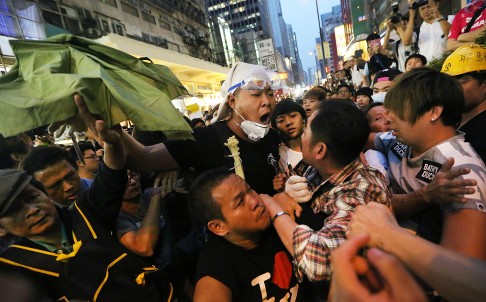
Scuffles break out between Occupy protesters and opponents in Mong Kok. Photo: Sam Tsang
During a heavy downpour in Mong Kok on Wednesday night, Maggie Chan Man-ki - district councillor and member of the pro-Beijing DAB party - visited Argyle Street as a representative of Chiu Luen Public Light Bus Company.
Chan read out a High Court injunction barring protesters from occupying the section of Argyle Street between Tung Choi Street and Portland Street.
She reminded protesters there that people who were occupying the area, or people attempting to obstruct the removal of barricades, at the intersection could be held in contempt of court.
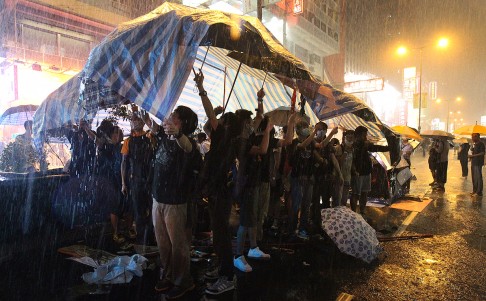
Protesters take cover as a downpour hits Mong Kok. Photo: Dickson Lee
However, Chan could be barely heard in the rain and some protesters five metres away yelled out that they couldn't hear her. Chan left the scene soon after.
Earlier, protesters listening to a public forum in Mong Kok were hit with four bags of what was suspected to be a mixture of faeces and oil thrown from a nearby building. No arrests were made.
Several protesters and at least two young children were splashed with the brown substance. People Power member Tam Tak-chi said he was hosting the forum when the four bags landed in the area where listeners were seated.
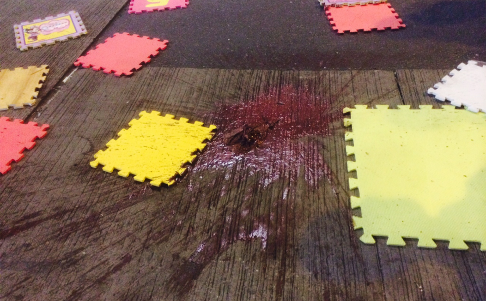
“We received a warning that faeces bombs would be thrown on Monday but it didn’t happen. It finally happened tonight,” he said. “We seriously condemn this incident and want police to take enforcement action.”
Earlier on Wednesday evening, firefighters were called to Mong Kok after a middle-aged man with a bag full of flammable substances attempted to set fire to a supply station run by Occupy protesters.
The man, said to be in his forties and dressed in a red top and shorts, threw three glass jars of flammable liquid paint thinner at protesters standing near the supply station, witnesses said.
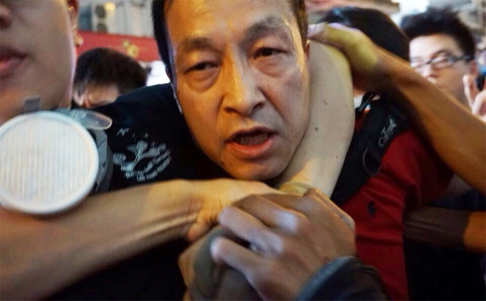
Police arrest the man over the suspected arson. Photo: Ernest Kao
He then tried to set the supplies ablaze with a lighter but failed. Protesters then apprehended the man until police arrived. One fire engine was dispatched.
“We surrounded him and grabbed the lighter from his hand,” said protester and witness Lam Shing-tong, who also got the fluid on his clothes.
“We kept shouting ‘Someone’s trying to start a fire!’ but police ignored us. They came after ten minutes. We could have all been set on fire.”
Lam said the man did not say anything before throwing the glass jars.
Another witness said the man had attempted to pull more bottles out from a brown leather backpack.
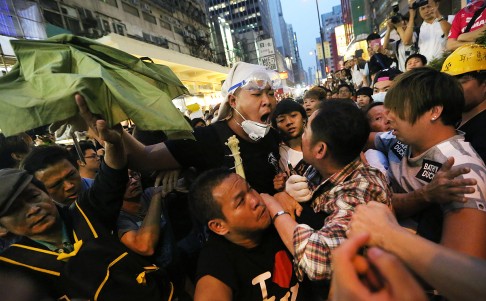
Scuffles break out between Occupy protesters and opponents in Mong Kok. Photo: Sam Tsang
“The suspect then mysteriously collapsed on the floor and was taken away in an ambulance,” said witness Wing Ngan. “I don’t understand why it took so long for police to react.”
Glass splinters were seen at the scene and a strong stench of paint thinner filled the air. The affected supplies were moved elsewhere for safety.
Earlier on on Wednesday, taxi drivers tore down barriers in Mong Kok but failed in an attempt to fully reopen Nathan Road to traffic after police intervened to bring their action to a halt.
Rubbish bins, fences, wooden pallets and bamboo poles were ripped up by members of the Taxi Drivers and Operators Association and loaded onto the back of a truck with a crane, as angry protesters rushed to stop the destruction at the Dundas Street end of Nathan Road.
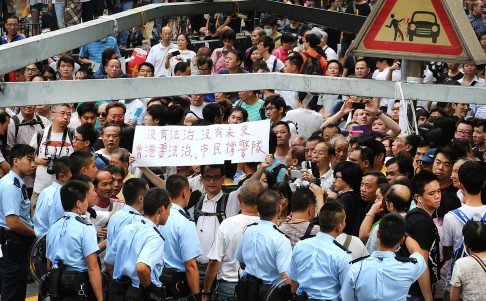
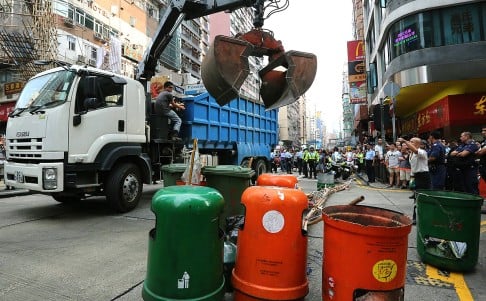
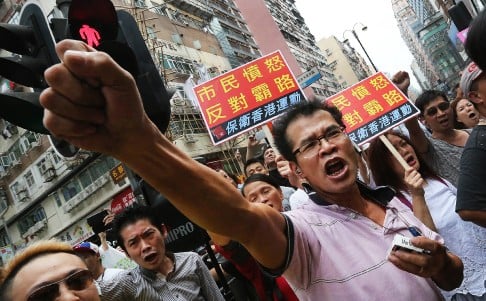
A stand-off ensued as protesters defended their barricades by sitting on them or putting the arms over them to shield them. Scores of police carrying shields formed a line to separate the two groups as more obstacles were removed. Police urged both sides to stay calm and not to resort to violence.
"We have the ability to [remove all the barriers] but police said it would cause chaos," said Eddie Ng Yip-pui, director general of the Taxi Drivers and Operators Association, whose members arrived in Mong Kok with a bailiff's order to remove the barricades.
Ng said the drivers would not return on Wednesday night, "but we will ask the court to extend the injunction on Friday," he said.
He did not rule out a "bigger-scale" action, should the court order be granted.
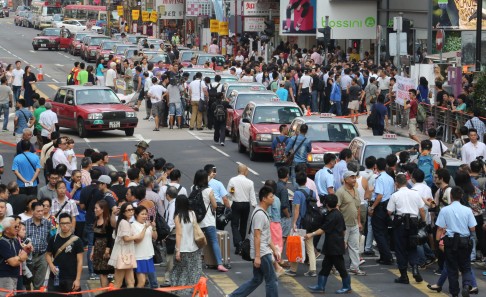
Taxi drivers parked on Argyle Street. Photo: Felix Wong
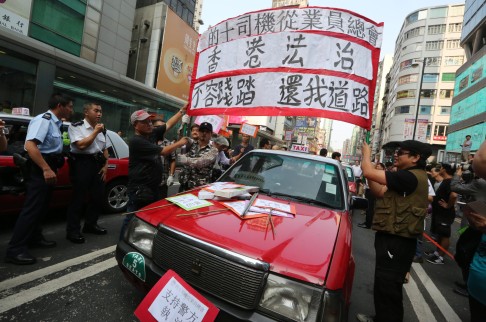
Taxi drivers complained that the protests have affected their livelihoods. Photo: Felix Wong
Court injunctions were granted to the taxi drivers' group and a minibus operators' group seeking to disperse the Mong Kok protesters on Monday. Another injunction was granted to Goldon Investment, owner of Citic Tower in Admiralty near government headquarters, where protesters have been lining pavements and roads since September 27.
On Wednesday morning, a group of some 20 staff from the Citic Tower were thwarted by students in an attempt to remove barricades on Lung Wui Road.
The students ignored a warning that they were in contempt of court from a representative of Citic’s legal department and a plea to clear the barricades because they were blocking a fire escape route.
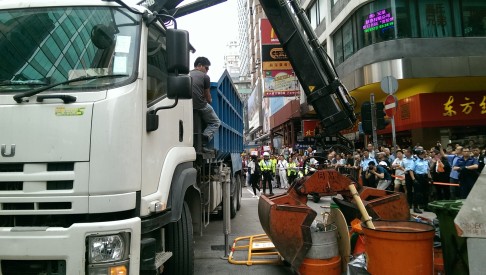
Barricades were torn down. Photo: Chris Lau
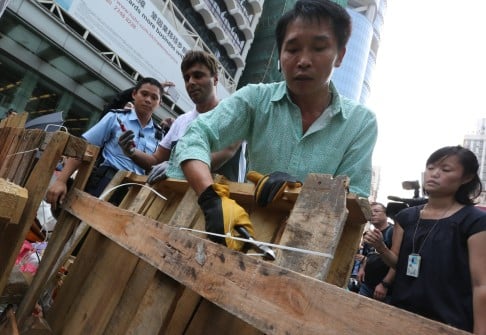
Protesters were powerless to stop some barriers being removed. Photo: Felix Wong
Meanwhile, more than 100 Occupy Central protesters marched from Admiralty to Government House on Wednesday afternoon over Chief Executive Leung Chun-ying’s remarks that free elections are unacceptable because poorer people would dominate the vote.
Protesters ignored police warnings that the march was unauthorised because it had not been registered.
The embattled chief executive reiterated his position that free elections were impossible in an interview with foreign media this week.
Leung said that if candidates were nominated by the public then the poor would likely dominate the electoral process.
“If it’s entirely a numbers game and numeric representation, then obviously you’d be talking to the half of the people in Hong Kong who earn less than US$1,800 a month [HK$13,964.2],” Leung said in comments published by the Wall Street Journal, the Financial Times and the International New York Times.
In a statement, the Chief Executive’s Office said on Wednesday that Leung made the remarks in an earlier interview with overseas media, when asked about the meaning of "broad representativeness" in the election committee and the nominating committee.
The future nominating committee will comprise four major sectors to take into account the needs of all classes and sectors, not just the needs of the largest community, Leung said.
He confirmed that income disparity is a problem in Hong Kong. He also pointed out that poverty alleviation, care for the elderly, and housing are among the major policy areas of his administration and that the government attaches great importance to the livelihood of the grass roots, according to the statement
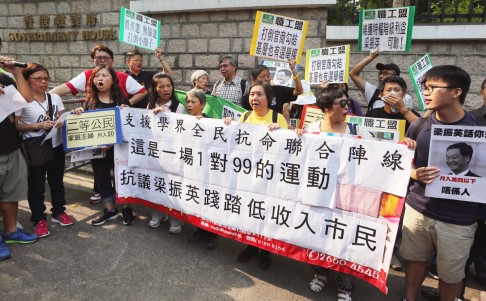
Marchers called for CY Leung to step down. Photo: Sam Tsang
A Facebook group called “Civil Servants Support Umbrella” on Wednesday announced the collection of more than 1,500 signatures from civil servants who support the protests.
The group was formed after the Government Employees Association and Hong Kong Civil Servants General Union released a joint statement on Monday to denounce the Occupy movement. The group said the viewpoint of these two unions did not represent them.
Civil servants who support Occupy have each uploaded a photo of their staff card which revealed their departments and job titles but concealed their name and staff number. From the photos, backing for the protests seems to come from almost all government departments – including from the police. One picture showed the staff card of a police commissioner, who expressed support towards the movement.
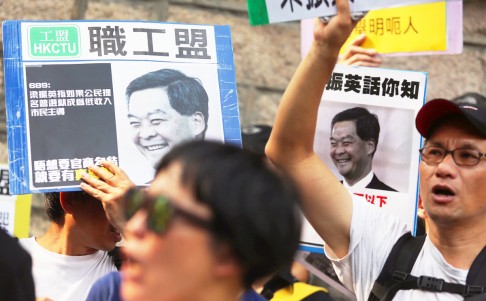
CY Leung reiterated his position that free elections were impossible in an interview with foreign media this week. Photo: Sam Tsang
Several university presidents hope there will be more talks between students and the government after the first round of dialogue on Tuesday.
Leonard Cheng Kwok-hon, president of Lingnan University and Tuesday's student-government meeting's moderator, said there is a higher possibility to solve the current stand-off between students and the government if there are more rounds of dialogue.
"I think the students performed very well yesterday," said Cheng. "They expressed themselves very clearly and they were very civilised."
Some people have criticised Cheng for being biased towards the government but he said he had no “malicious intention" and his purpose in asking questions was to let the students have an opportunity to explain their demands.
Peter Mathieson, vice-chancellor of the University of Hong Kong, said more clarification was needed to clear the "misunderstandings" between the two sides.
"I think repeating what's been said before sometimes doesn't always help, but if it can be clarified or explained in a different way [it can help]," Mathieson said.
"I know the government had major constraints on what it can and can't do, so both parties need to understand what's possible and what's realistic, not necessarily what would be ideal."
Chinese University president Joseph Sung Jao-yiu and president of the University of Science and Technology Tony Chan Fan-cheong also expressed similar ideas of hoping more conversations to come.
Elsewhere, Police arrested a 20-year-old man this morning in Wan Chai for criminally intimidating a police officer's daughter.
Chief superintendent Steve Hui Chun-tak, of the Police Public Relations Branch, said the man is being detained pending further investigation.
"This man sent threatening message to an officer's daughter. This is a very serious offence. We will seriously look into the case," he told reporters in the daily press briefing.
He also said some had uploaded the personal information of police officers and families on the internet, where they were made targets of personal attack on social media.
"Some people even called on others to bully our officers' children at school ... The police condemn this cyberbullying act," he said, adding that laws in the real world are applicable to the internet as he called for an end to the harassment.
Hui also noted someone had incited others to occupy the airport.
"They attempt to create chaos. Such behaviour is extremely irresponsible and must be strongly condemned," he said.
He said the Hong Kong International Airport is a critical infrastructure and anyone who disrupts public order or behave improperly could be arrested.
Chris Lau, Alan Yu, Shirley Zhao, Emily Tsang, KC Ng, Timmy Sung
Firefighters called to Mong Kok after suspected arson attack at Occupy protest zone
PUBLISHED : Wednesday, 22 October, 2014, 3:14pm
UPDATED : Wednesday, 22 October, 2014, 11:14pm
Staff reporters

Scuffles break out between Occupy protesters and opponents in Mong Kok. Photo: Sam Tsang
During a heavy downpour in Mong Kok on Wednesday night, Maggie Chan Man-ki - district councillor and member of the pro-Beijing DAB party - visited Argyle Street as a representative of Chiu Luen Public Light Bus Company.
Chan read out a High Court injunction barring protesters from occupying the section of Argyle Street between Tung Choi Street and Portland Street.
She reminded protesters there that people who were occupying the area, or people attempting to obstruct the removal of barricades, at the intersection could be held in contempt of court.

Protesters take cover as a downpour hits Mong Kok. Photo: Dickson Lee
However, Chan could be barely heard in the rain and some protesters five metres away yelled out that they couldn't hear her. Chan left the scene soon after.
Earlier, protesters listening to a public forum in Mong Kok were hit with four bags of what was suspected to be a mixture of faeces and oil thrown from a nearby building. No arrests were made.
Several protesters and at least two young children were splashed with the brown substance. People Power member Tam Tak-chi said he was hosting the forum when the four bags landed in the area where listeners were seated.

“We received a warning that faeces bombs would be thrown on Monday but it didn’t happen. It finally happened tonight,” he said. “We seriously condemn this incident and want police to take enforcement action.”
Earlier on Wednesday evening, firefighters were called to Mong Kok after a middle-aged man with a bag full of flammable substances attempted to set fire to a supply station run by Occupy protesters.
The man, said to be in his forties and dressed in a red top and shorts, threw three glass jars of flammable liquid paint thinner at protesters standing near the supply station, witnesses said.

Police arrest the man over the suspected arson. Photo: Ernest Kao
He then tried to set the supplies ablaze with a lighter but failed. Protesters then apprehended the man until police arrived. One fire engine was dispatched.
“We surrounded him and grabbed the lighter from his hand,” said protester and witness Lam Shing-tong, who also got the fluid on his clothes.
“We kept shouting ‘Someone’s trying to start a fire!’ but police ignored us. They came after ten minutes. We could have all been set on fire.”
Lam said the man did not say anything before throwing the glass jars.
Another witness said the man had attempted to pull more bottles out from a brown leather backpack.

Scuffles break out between Occupy protesters and opponents in Mong Kok. Photo: Sam Tsang
“The suspect then mysteriously collapsed on the floor and was taken away in an ambulance,” said witness Wing Ngan. “I don’t understand why it took so long for police to react.”
Glass splinters were seen at the scene and a strong stench of paint thinner filled the air. The affected supplies were moved elsewhere for safety.
Earlier on on Wednesday, taxi drivers tore down barriers in Mong Kok but failed in an attempt to fully reopen Nathan Road to traffic after police intervened to bring their action to a halt.
Rubbish bins, fences, wooden pallets and bamboo poles were ripped up by members of the Taxi Drivers and Operators Association and loaded onto the back of a truck with a crane, as angry protesters rushed to stop the destruction at the Dundas Street end of Nathan Road.



A stand-off ensued as protesters defended their barricades by sitting on them or putting the arms over them to shield them. Scores of police carrying shields formed a line to separate the two groups as more obstacles were removed. Police urged both sides to stay calm and not to resort to violence.
"We have the ability to [remove all the barriers] but police said it would cause chaos," said Eddie Ng Yip-pui, director general of the Taxi Drivers and Operators Association, whose members arrived in Mong Kok with a bailiff's order to remove the barricades.
Ng said the drivers would not return on Wednesday night, "but we will ask the court to extend the injunction on Friday," he said.
He did not rule out a "bigger-scale" action, should the court order be granted.

Taxi drivers parked on Argyle Street. Photo: Felix Wong

Taxi drivers complained that the protests have affected their livelihoods. Photo: Felix Wong
Court injunctions were granted to the taxi drivers' group and a minibus operators' group seeking to disperse the Mong Kok protesters on Monday. Another injunction was granted to Goldon Investment, owner of Citic Tower in Admiralty near government headquarters, where protesters have been lining pavements and roads since September 27.
On Wednesday morning, a group of some 20 staff from the Citic Tower were thwarted by students in an attempt to remove barricades on Lung Wui Road.
The students ignored a warning that they were in contempt of court from a representative of Citic’s legal department and a plea to clear the barricades because they were blocking a fire escape route.

Barricades were torn down. Photo: Chris Lau

Protesters were powerless to stop some barriers being removed. Photo: Felix Wong
Meanwhile, more than 100 Occupy Central protesters marched from Admiralty to Government House on Wednesday afternoon over Chief Executive Leung Chun-ying’s remarks that free elections are unacceptable because poorer people would dominate the vote.
Protesters ignored police warnings that the march was unauthorised because it had not been registered.
The embattled chief executive reiterated his position that free elections were impossible in an interview with foreign media this week.
Leung said that if candidates were nominated by the public then the poor would likely dominate the electoral process.
“If it’s entirely a numbers game and numeric representation, then obviously you’d be talking to the half of the people in Hong Kong who earn less than US$1,800 a month [HK$13,964.2],” Leung said in comments published by the Wall Street Journal, the Financial Times and the International New York Times.
In a statement, the Chief Executive’s Office said on Wednesday that Leung made the remarks in an earlier interview with overseas media, when asked about the meaning of "broad representativeness" in the election committee and the nominating committee.
The future nominating committee will comprise four major sectors to take into account the needs of all classes and sectors, not just the needs of the largest community, Leung said.
He confirmed that income disparity is a problem in Hong Kong. He also pointed out that poverty alleviation, care for the elderly, and housing are among the major policy areas of his administration and that the government attaches great importance to the livelihood of the grass roots, according to the statement

Marchers called for CY Leung to step down. Photo: Sam Tsang
A Facebook group called “Civil Servants Support Umbrella” on Wednesday announced the collection of more than 1,500 signatures from civil servants who support the protests.
The group was formed after the Government Employees Association and Hong Kong Civil Servants General Union released a joint statement on Monday to denounce the Occupy movement. The group said the viewpoint of these two unions did not represent them.
Civil servants who support Occupy have each uploaded a photo of their staff card which revealed their departments and job titles but concealed their name and staff number. From the photos, backing for the protests seems to come from almost all government departments – including from the police. One picture showed the staff card of a police commissioner, who expressed support towards the movement.

CY Leung reiterated his position that free elections were impossible in an interview with foreign media this week. Photo: Sam Tsang
Several university presidents hope there will be more talks between students and the government after the first round of dialogue on Tuesday.
Leonard Cheng Kwok-hon, president of Lingnan University and Tuesday's student-government meeting's moderator, said there is a higher possibility to solve the current stand-off between students and the government if there are more rounds of dialogue.
"I think the students performed very well yesterday," said Cheng. "They expressed themselves very clearly and they were very civilised."
Some people have criticised Cheng for being biased towards the government but he said he had no “malicious intention" and his purpose in asking questions was to let the students have an opportunity to explain their demands.
Peter Mathieson, vice-chancellor of the University of Hong Kong, said more clarification was needed to clear the "misunderstandings" between the two sides.
"I think repeating what's been said before sometimes doesn't always help, but if it can be clarified or explained in a different way [it can help]," Mathieson said.
"I know the government had major constraints on what it can and can't do, so both parties need to understand what's possible and what's realistic, not necessarily what would be ideal."
Chinese University president Joseph Sung Jao-yiu and president of the University of Science and Technology Tony Chan Fan-cheong also expressed similar ideas of hoping more conversations to come.
Elsewhere, Police arrested a 20-year-old man this morning in Wan Chai for criminally intimidating a police officer's daughter.
Chief superintendent Steve Hui Chun-tak, of the Police Public Relations Branch, said the man is being detained pending further investigation.
"This man sent threatening message to an officer's daughter. This is a very serious offence. We will seriously look into the case," he told reporters in the daily press briefing.
He also said some had uploaded the personal information of police officers and families on the internet, where they were made targets of personal attack on social media.
"Some people even called on others to bully our officers' children at school ... The police condemn this cyberbullying act," he said, adding that laws in the real world are applicable to the internet as he called for an end to the harassment.
Hui also noted someone had incited others to occupy the airport.
"They attempt to create chaos. Such behaviour is extremely irresponsible and must be strongly condemned," he said.
He said the Hong Kong International Airport is a critical infrastructure and anyone who disrupts public order or behave improperly could be arrested.
Chris Lau, Alan Yu, Shirley Zhao, Emily Tsang, KC Ng, Timmy Sung
Re: China blocks bbc website after video shows hong kong police beating protester
More than 70 Hong Kong government websites ‘under attack from Anonymous hackers’
PUBLISHED : Wednesday, 22 October, 2014, 5:00pm
UPDATED : Wednesday, 22 October, 2014, 6:34pm
Emily Tsang [email protected]
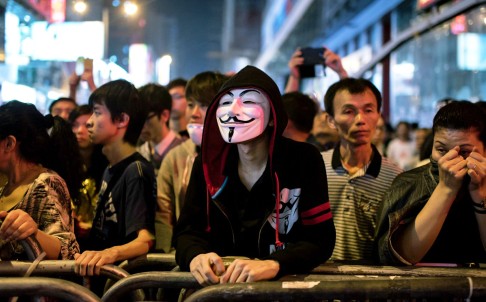
A protester in Hong Kong wearing a Guy Fawkes mask. Supporters of the Anonymous movement have adopted the mask as their emblem. Photo: AFP
Over 70 government websites have been targeted this month by cyberattacks believed to have been directed by hackers operating under the banner of Anonymous, a brand adopted by activists and hackers around the world.
Commerce secretary Greg So Kam-leung told lawmakers that no information had been stolen or altered from the official websites, which had been intermittently inaccessible after surges of requests to access them.
By Wednesday, eight men and three women had been arrested by police in connection with the cyberattacks, on suspicion of accessing a computer with criminal or dishonest intent, So said.
“Attacks launched by the hacker group partly originated from Hong Kong, and partly from other regions outside Hong Kong,” he said.
“Since the group can be joined by any netizen, [the attack] could be originated from all over the world and it is hard to find out their nationalities.”
Internet users identifying themselves as Anonymous hackers issued a warning to the government and police force on October 2 after tear gas was fired at pro-democracy demonstrators in the city.
A number of official sites were made inaccessible on October 3 by distributed denial-of-service (DDoS) attacks. During such attacks, website infrastructure is overwhelmed by a huge number of requests to access the site, ultimately making the site inaccessible.
The attacks can also slow down website functionality. But So said the cyberattacks had not impacted significantly on the government’s online services, and emphasised that security had not been compromised.
The website of the pro-democracy newspaper Apple Daily has also been the target of sustained cyberattacks in recent weeks, coinciding with a blockade of its offices in Tseung Kwan O by pro-Beijing protesters.
No group has claimed responsibility for those cyberattacks, which followed similar attempts to make the Apple Daily website inaccessible in June during the Occupy Central electoral reform referendum.
An attempt to block access to the referendum's online polling system was described by one internet security expert as "the most sophisticated ever".
So mentioned that some individual local websites had also come under attack, but such actions had not had a “significant impact on the city’s economic activities”.
Police are still investigating those cases, he said.
More than 70 Hong Kong government websites ‘under attack from Anonymous hackers’
PUBLISHED : Wednesday, 22 October, 2014, 5:00pm
UPDATED : Wednesday, 22 October, 2014, 6:34pm
Emily Tsang [email protected]

A protester in Hong Kong wearing a Guy Fawkes mask. Supporters of the Anonymous movement have adopted the mask as their emblem. Photo: AFP
Over 70 government websites have been targeted this month by cyberattacks believed to have been directed by hackers operating under the banner of Anonymous, a brand adopted by activists and hackers around the world.
Commerce secretary Greg So Kam-leung told lawmakers that no information had been stolen or altered from the official websites, which had been intermittently inaccessible after surges of requests to access them.
By Wednesday, eight men and three women had been arrested by police in connection with the cyberattacks, on suspicion of accessing a computer with criminal or dishonest intent, So said.
“Attacks launched by the hacker group partly originated from Hong Kong, and partly from other regions outside Hong Kong,” he said.
“Since the group can be joined by any netizen, [the attack] could be originated from all over the world and it is hard to find out their nationalities.”
Internet users identifying themselves as Anonymous hackers issued a warning to the government and police force on October 2 after tear gas was fired at pro-democracy demonstrators in the city.
A number of official sites were made inaccessible on October 3 by distributed denial-of-service (DDoS) attacks. During such attacks, website infrastructure is overwhelmed by a huge number of requests to access the site, ultimately making the site inaccessible.
The attacks can also slow down website functionality. But So said the cyberattacks had not impacted significantly on the government’s online services, and emphasised that security had not been compromised.
The website of the pro-democracy newspaper Apple Daily has also been the target of sustained cyberattacks in recent weeks, coinciding with a blockade of its offices in Tseung Kwan O by pro-Beijing protesters.
No group has claimed responsibility for those cyberattacks, which followed similar attempts to make the Apple Daily website inaccessible in June during the Occupy Central electoral reform referendum.
An attempt to block access to the referendum's online polling system was described by one internet security expert as "the most sophisticated ever".
So mentioned that some individual local websites had also come under attack, but such actions had not had a “significant impact on the city’s economic activities”.
Police are still investigating those cases, he said.
Re: Give me Liberty or Give me Death! Giordano Tycoon joins Occupy Central!
‘Yellow Umbrella’ video game tasks players with defending Occupy Central barricades
PUBLISHED : Wednesday, 22 October, 2014, 4:47pm
UPDATED : Wednesday, 22 October, 2014, 6:42pm
James Griffiths [email protected]
<iframe src="//www.youtube.com/embed/5wzTrAtbtKE?rel=0&showinfo=0" allowfullscreen="" frameborder="0" height="360" width="640"></iframe>
A newly launched video game lets those who did not get to experience the Occupy Central protests first-hand to get a feel for the civil disobedience movement.
Named Yellow Umbrella after the movement’s most iconic symbol, the tower-defence game has been downloaded thousands of times since it was released on Tuesday.
In the spirit of non-violence espoused by the student protesters, players are unable to attack. Instead, they must defend their camp as waves of police officers, triads, angry anti-Occupy protesters and even Chief Executive Leung Chun-ying himself attack the barricades.
Those real-life barricades were under threat on Wednesday, as a taxi drivers’ association started tearing down fences and fortifications in Mong Kok.
The game’s developer told the South China Morning Post that he was inspired to create the game after witnessing the protesters’ resolve in the face of “violence from the anti-Occupy people and even the police”.
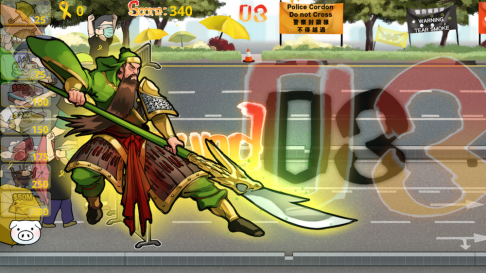
The Chinese god "Kwan Tai" appears to help players repel the police and gangsters seeking to remove the barricades. Photo: SCMP Pictures
“In my point of view, the students are fighting for democracy not only for themselves, but also for the anti-Occupy people and even the police,” said Fung Kam Keung of Hong Kong developing company Awesapp. “They should not be treated like this. Shame on the CY government.”
Fung, who had previously joined the protests in Admiralty and Mong Kok, said he felt that not enough people were willing to show their support for the students.
“I felt we needed to do something to wake the people up,” he said. “My team and I worked day and night for five days to finish the game” before the student-government talks took place on Tuesday night.
“The game is not only for fun, but also to show our support for the students.”
Players of the game can use yellow ribbons to “buy” different defensive tools to use against specific attackers, such as HK$500 to give to triads (referring to allegations that anti-Occupy protesters were paid to take part) and umbrellas to fight off police pepper spray.
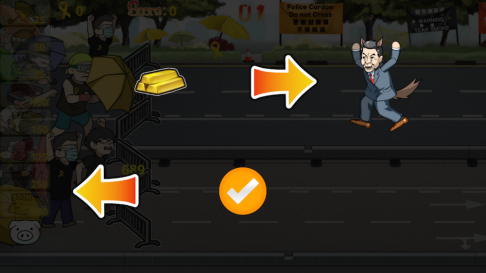
Players can use a HK$50 million gold brick to defeat the final boss, Chief Executive Leung Chun-ying himself. Photo: SCMP Pictures
Players can also unleash “HK$50 million worth of gold blocks” to see off the game’s final boss, CY Leung – a reference to the controversy over the money he received from Australian engineering firm UGL.
Since its release, the game has leaped up the ranks of the Google Play store for Android apps, and a version for iOS devices is currently under review by Apple.
Yellow Umbrella is not Awesapp’s first stab at political satire. The company’s other titles include Angry Lufsig, an Angry Birds-style game where players launch projectiles at wolves (representing CY Leung), as well as Toilet of Plagiarists, a parody of Tower of Saviours, a popular video game advertised heavily in Hong Kong which many accused of having ripped off Japanese title Puzzle & Dragons.
‘Yellow Umbrella’ video game tasks players with defending Occupy Central barricades
PUBLISHED : Wednesday, 22 October, 2014, 4:47pm
UPDATED : Wednesday, 22 October, 2014, 6:42pm
James Griffiths [email protected]
<iframe src="//www.youtube.com/embed/5wzTrAtbtKE?rel=0&showinfo=0" allowfullscreen="" frameborder="0" height="360" width="640"></iframe>
A newly launched video game lets those who did not get to experience the Occupy Central protests first-hand to get a feel for the civil disobedience movement.
Named Yellow Umbrella after the movement’s most iconic symbol, the tower-defence game has been downloaded thousands of times since it was released on Tuesday.
In the spirit of non-violence espoused by the student protesters, players are unable to attack. Instead, they must defend their camp as waves of police officers, triads, angry anti-Occupy protesters and even Chief Executive Leung Chun-ying himself attack the barricades.
Those real-life barricades were under threat on Wednesday, as a taxi drivers’ association started tearing down fences and fortifications in Mong Kok.
The game’s developer told the South China Morning Post that he was inspired to create the game after witnessing the protesters’ resolve in the face of “violence from the anti-Occupy people and even the police”.

The Chinese god "Kwan Tai" appears to help players repel the police and gangsters seeking to remove the barricades. Photo: SCMP Pictures
“In my point of view, the students are fighting for democracy not only for themselves, but also for the anti-Occupy people and even the police,” said Fung Kam Keung of Hong Kong developing company Awesapp. “They should not be treated like this. Shame on the CY government.”
Fung, who had previously joined the protests in Admiralty and Mong Kok, said he felt that not enough people were willing to show their support for the students.
“I felt we needed to do something to wake the people up,” he said. “My team and I worked day and night for five days to finish the game” before the student-government talks took place on Tuesday night.
“The game is not only for fun, but also to show our support for the students.”
Players of the game can use yellow ribbons to “buy” different defensive tools to use against specific attackers, such as HK$500 to give to triads (referring to allegations that anti-Occupy protesters were paid to take part) and umbrellas to fight off police pepper spray.

Players can use a HK$50 million gold brick to defeat the final boss, Chief Executive Leung Chun-ying himself. Photo: SCMP Pictures
Players can also unleash “HK$50 million worth of gold blocks” to see off the game’s final boss, CY Leung – a reference to the controversy over the money he received from Australian engineering firm UGL.
Since its release, the game has leaped up the ranks of the Google Play store for Android apps, and a version for iOS devices is currently under review by Apple.
Yellow Umbrella is not Awesapp’s first stab at political satire. The company’s other titles include Angry Lufsig, an Angry Birds-style game where players launch projectiles at wolves (representing CY Leung), as well as Toilet of Plagiarists, a parody of Tower of Saviours, a popular video game advertised heavily in Hong Kong which many accused of having ripped off Japanese title Puzzle & Dragons.
China to ban movies featuring hong kong celebrities that support the protest
[h=1]CHINA TO BAN MOVIES FEATURING HONG KONG CELEBRITIES THAT SUPPORT THE PROTEST[/h]
<!-- /.block --> <style>.node-article .field-name-link-line-above-tags{float: right;}.node-article .field-name-ad-box-in-article {float: left;margin: 15px 15px 10px 0;}.node-article .field-tags{clear: both;}</style> Post date:
23 Oct 2014 - 7:03pm

<ins id="aswift_0_expand" style="margin: 0px; padding: 0px; border: currentColor; width: 336px; height: 280px; display: inline-table; visibility: visible; position: relative; background-color: transparent; border-image: none;"><ins id="aswift_0_anchor" style="margin: 0px; padding: 0px; border: currentColor; width: 336px; height: 280px; display: block; visibility: visible; position: relative; background-color: transparent; border-image: none;"><iframe name="aswift_0" width="336" height="280" id="aswift_0" frameBorder="0" marginWidth="0" marginHeight="0" scrolling="no" vspace="0" hspace="0" allowfullscreen="true" style="left: 0px; top: 0px; position: absolute;" allowTransparency="true"></iframe></ins></ins>
The powerful Youth League of China's ruling Communist party has opened a poll on possible sanctions against Hong Kong celebrities who support the city's pro-democracy demonstrators -- including boycotts, bans and Internet censorship.
The former British colony's vibrant film and music scenes have made its performers stars on the mainland. But celebrities including actors Chow Yun Fat and Anthony Wong have reportedly praised the protesters, who are labelled as criminals by Beijing.
"Which way would you choose to resist these unscrupulous artists?" the Communist Party's Youth League asked readers of its official microblog, naming several celebrities including Wong.
"Call for 'Occupy Central' artists to be banned from performing or broadcasting in mainland China," read the most popular of the poll's four possible responses.
"Call for 'Occupy Central' artists' names to be scrubbed from the Internet," was in second place.
Occupy Central is one of the main groups organising the pro-democracy protests, but mainland Chinese authorities and media often use the term to refer to the demonstrations generally.
The less harsh options available were "Delete the 'Occupy Central' artists' microblog accounts" and "Resolutely not watch the works of 'Occupy Central' artists".
There was no option not to take action.
The microblog post singled out Wong by name along with fellow actor Chapman To and singer Denise Ho. The poll had attracted more than 200,000 votes by Wednesday afternoon.
The Communist Youth League boasts nearly 90 million members, and serves as a training ground for future party officials. Notable alumni include former President Hu Jintao.
<ins id="aswift_1_expand" style="margin: 0px; padding: 0px; border: currentColor; width: 336px; height: 280px; display: inline-table; visibility: visible; position: relative; background-color: transparent; border-image: none;"><ins id="aswift_1_anchor" style="margin: 0px; padding: 0px; border: currentColor; width: 336px; height: 280px; display: block; visibility: visible; position: relative; background-color: transparent; border-image: none;"><iframe name="aswift_1" width="336" height="280" id="aswift_1" frameBorder="0" marginWidth="0" marginHeight="0" scrolling="no" vspace="0" hspace="0" allowfullscreen="true" style="left: 0px; top: 0px; position: absolute;" allowTransparency="true"></iframe></ins></ins>
Hong Kong student leaders said Wednesday they may not take part in further talks with the government after accusing city authorities of failing to make any meaningful offer to end weeks of mass rallies.
Chief Executive Leung Chun-ying, in an interview late Monday, said open elections for his successor as demanded by demonstrators would result in the largest sector of society -- the city's poor -- dominating the electoral process.
Source: AFP
[h=1]CHINA TO BAN MOVIES FEATURING HONG KONG CELEBRITIES THAT SUPPORT THE PROTEST[/h]
<!-- /.block --> <style>.node-article .field-name-link-line-above-tags{float: right;}.node-article .field-name-ad-box-in-article {float: left;margin: 15px 15px 10px 0;}.node-article .field-tags{clear: both;}</style> Post date:
23 Oct 2014 - 7:03pm

<ins id="aswift_0_expand" style="margin: 0px; padding: 0px; border: currentColor; width: 336px; height: 280px; display: inline-table; visibility: visible; position: relative; background-color: transparent; border-image: none;"><ins id="aswift_0_anchor" style="margin: 0px; padding: 0px; border: currentColor; width: 336px; height: 280px; display: block; visibility: visible; position: relative; background-color: transparent; border-image: none;"><iframe name="aswift_0" width="336" height="280" id="aswift_0" frameBorder="0" marginWidth="0" marginHeight="0" scrolling="no" vspace="0" hspace="0" allowfullscreen="true" style="left: 0px; top: 0px; position: absolute;" allowTransparency="true"></iframe></ins></ins>
The powerful Youth League of China's ruling Communist party has opened a poll on possible sanctions against Hong Kong celebrities who support the city's pro-democracy demonstrators -- including boycotts, bans and Internet censorship.
The former British colony's vibrant film and music scenes have made its performers stars on the mainland. But celebrities including actors Chow Yun Fat and Anthony Wong have reportedly praised the protesters, who are labelled as criminals by Beijing.
"Which way would you choose to resist these unscrupulous artists?" the Communist Party's Youth League asked readers of its official microblog, naming several celebrities including Wong.
"Call for 'Occupy Central' artists to be banned from performing or broadcasting in mainland China," read the most popular of the poll's four possible responses.
"Call for 'Occupy Central' artists' names to be scrubbed from the Internet," was in second place.
Occupy Central is one of the main groups organising the pro-democracy protests, but mainland Chinese authorities and media often use the term to refer to the demonstrations generally.
The less harsh options available were "Delete the 'Occupy Central' artists' microblog accounts" and "Resolutely not watch the works of 'Occupy Central' artists".
There was no option not to take action.
The microblog post singled out Wong by name along with fellow actor Chapman To and singer Denise Ho. The poll had attracted more than 200,000 votes by Wednesday afternoon.
The Communist Youth League boasts nearly 90 million members, and serves as a training ground for future party officials. Notable alumni include former President Hu Jintao.
<ins id="aswift_1_expand" style="margin: 0px; padding: 0px; border: currentColor; width: 336px; height: 280px; display: inline-table; visibility: visible; position: relative; background-color: transparent; border-image: none;"><ins id="aswift_1_anchor" style="margin: 0px; padding: 0px; border: currentColor; width: 336px; height: 280px; display: block; visibility: visible; position: relative; background-color: transparent; border-image: none;"><iframe name="aswift_1" width="336" height="280" id="aswift_1" frameBorder="0" marginWidth="0" marginHeight="0" scrolling="no" vspace="0" hspace="0" allowfullscreen="true" style="left: 0px; top: 0px; position: absolute;" allowTransparency="true"></iframe></ins></ins>
Hong Kong student leaders said Wednesday they may not take part in further talks with the government after accusing city authorities of failing to make any meaningful offer to end weeks of mass rallies.
Chief Executive Leung Chun-ying, in an interview late Monday, said open elections for his successor as demanded by demonstrators would result in the largest sector of society -- the city's poor -- dominating the electoral process.
Source: AFP
Similar threads
- Replies
- 2
- Views
- 333
- Replies
- 8
- Views
- 511
- Replies
- 1
- Views
- 686


